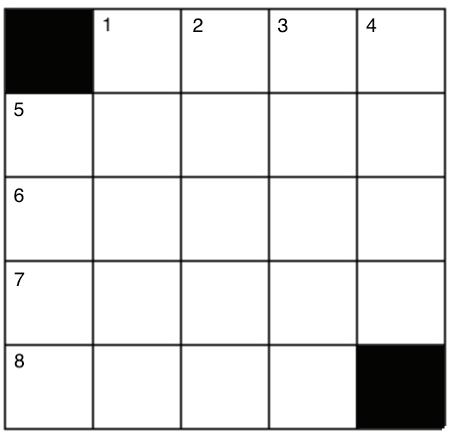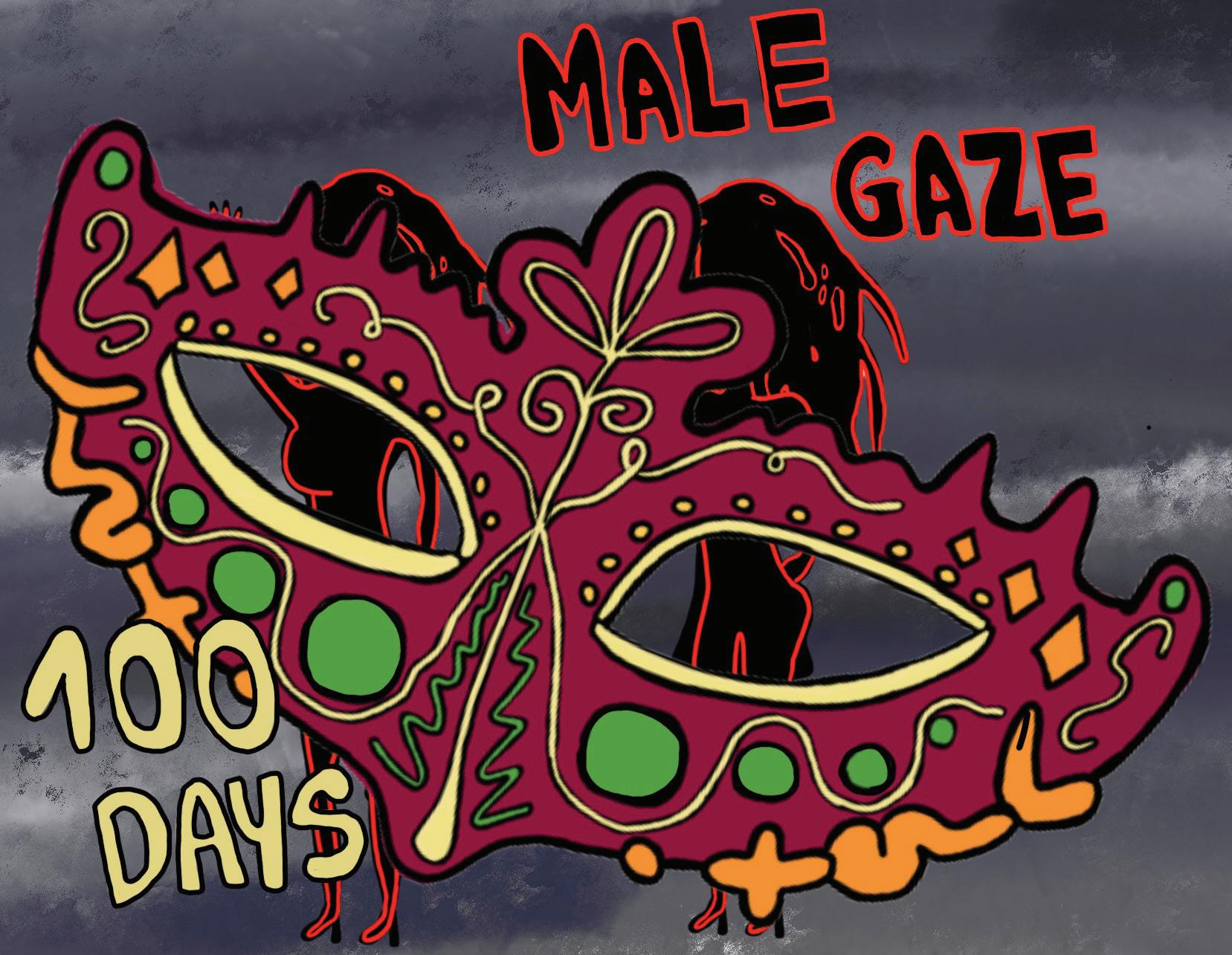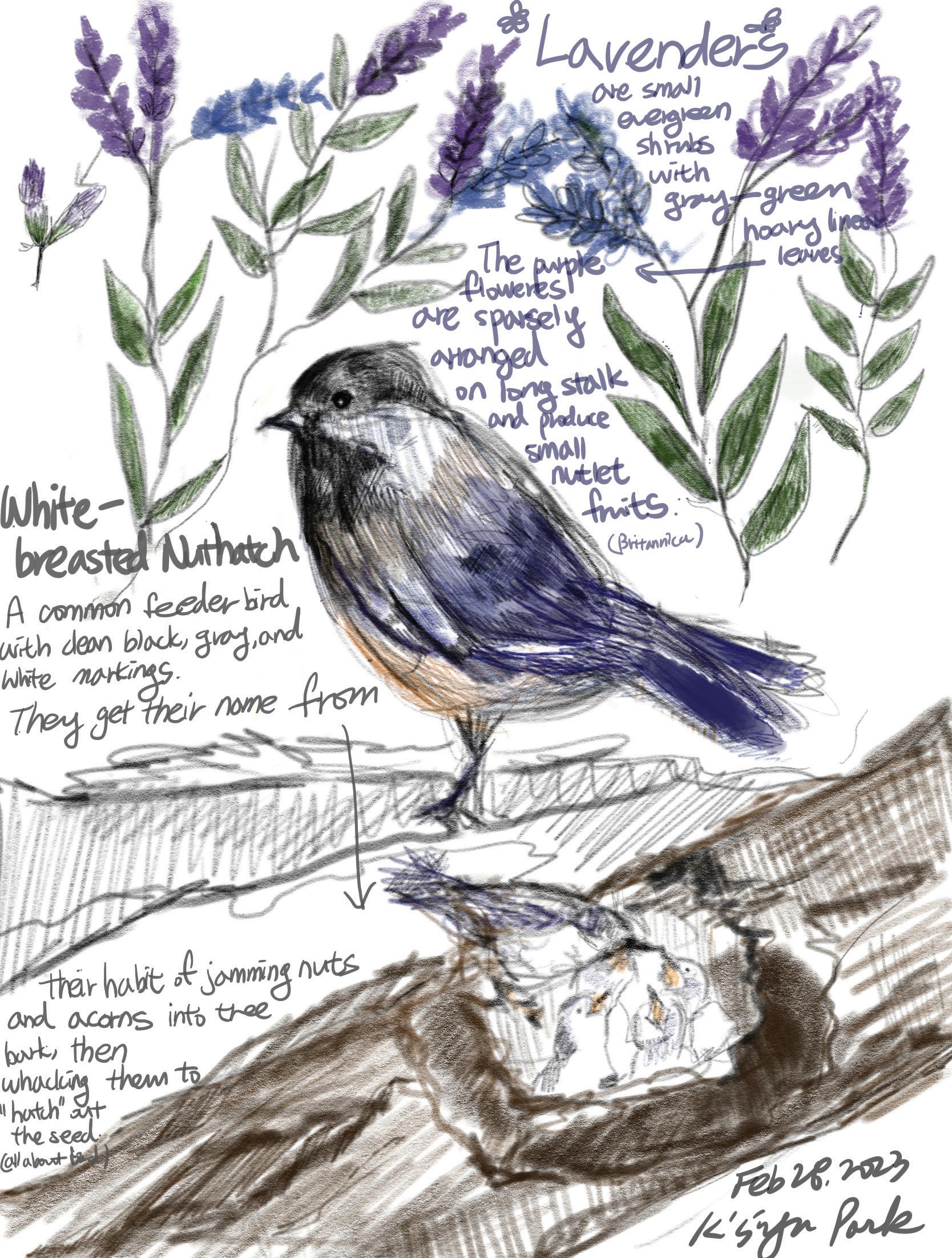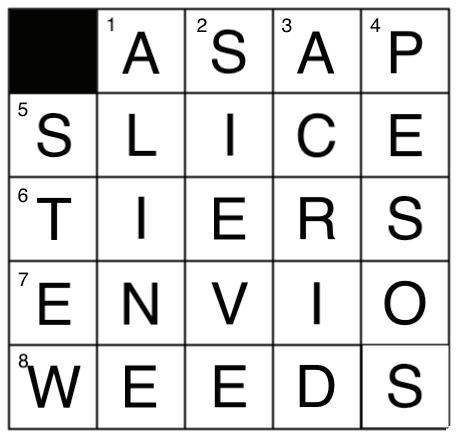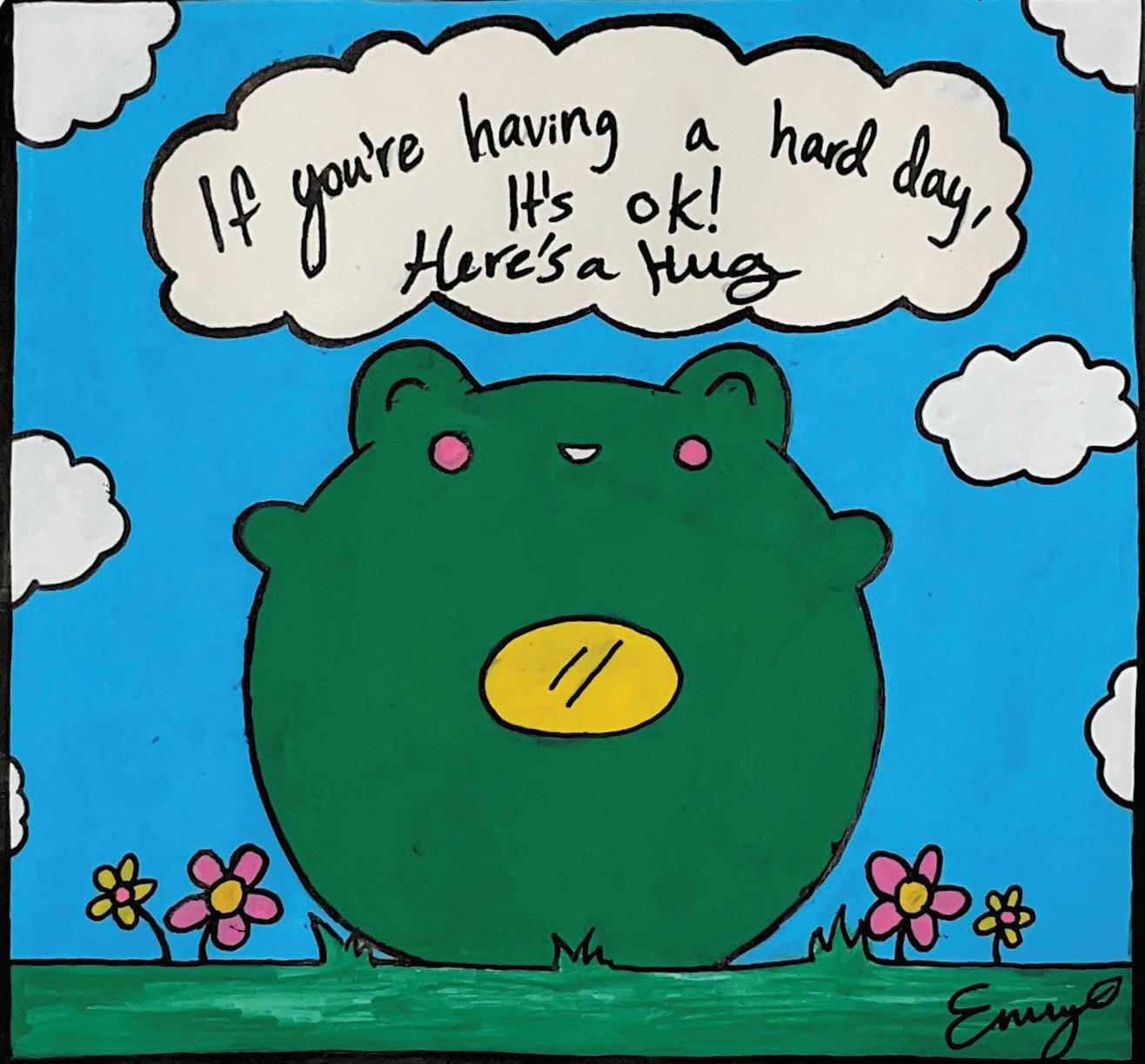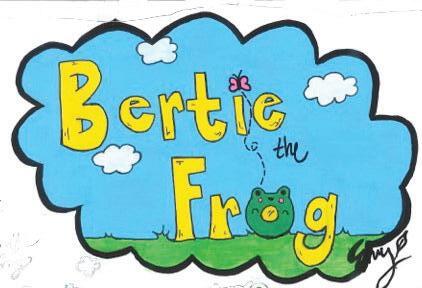Court records reveal College sued for discrimination in Title IX
By Nina Baker bakernin@grinnell.eduTwo lawsuits, one dismissed and the other settled out of court, describe details in Grinnell College
Op-Ed: connecting to resources
 By Millie Peck peckcami@grinnell.edu
By Millie Peck peckcami@grinnell.edu
CW: In this series, I will be discussing eating disorders and their devastating effects. As someone who has an eating disorder, I try my very best to never describe specific behaviors or comparative numbers, as that can be very damaging, but the material may be upsetting nonetheless. If you decide not to read, thank you for taking care of yourself.
While at residential treatment, I was told that recovering from an eating disorder is a full-time job. Learn-
ing how to rethink and undo years of ingrained thinking is the hardest thing I have ever done. As I described in my last installment, an eating disorder is really a way of coping. So, when I stopped engaging in any disordered behaviors, my brain went into overdrive. The voice inside my head became meaner and louder, barely able to think about anything other than how much I hated how my body looked. Every time I got stressed the voice told me that I’d feel better if I got thinner, so I found it easier to engage in the behavior than sit with the feeling.
Working Differently recieves mixed feedback
By Zach Spindler-Krage spindler@grinnell.eduThis spring, Working Differently Days have formally returned, and the initial feedback is mixed.
On March 2, Grinnell College students, faculty and staff had their first Working Differently Day of the semester. This was the first of two days in the spring semester where no classes, standing meetings or co-curricular activities were held. While meant to help reinstitute a healthy work-life balance, some students and professors have found the Working Differently Days to actually increase their workload and stress.
Working Differently Days were introduced by Elaine Marzluff, former interim dean of the college, in the spring 2022 semester. Due to mixed feedback from numerous college committees, the Grinnell College Office of the Dean decided not to implement formal Working Differently Days in fall 2022. Instead, Beronda Montgom-
ery, dean of Grinnell College, encouraged faculty to “use the fall semester of 2022 to intentionally consider how to promote operationalization of these days that best supports the health of individuals,” according to a campus-wide email sent on Aug. 9.
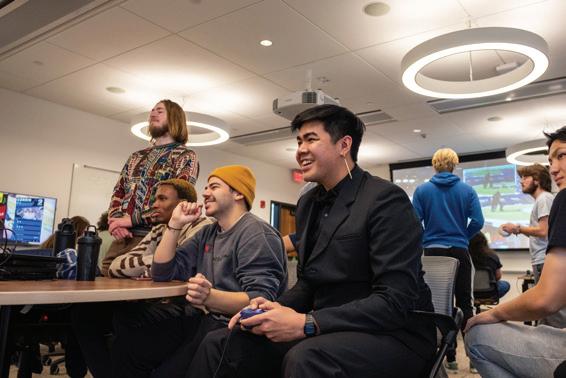
Tim Arner, associate dean of curriculum and academic programs, said that although he was not directly involved in the creation of Working Differently Days, he has been fielding many questions from faculty, staff and students about the purpose and guidelines of these days.
“We heard from the campus community that there is significant burnout and difficulty keeping up with the pace of things,” he said. “So these days were meant to be responsive to the cry for help in managing work-life balance.”
Arner says that there is intended to be flexibility for faculty to negotiate specific utilizations of the days. “We want these days to be purposely disruptive, but not in a way that produces anxiety,” he said. “The last thing we
complaints to using an external adjudicator, a role frequently filled by Marsha Ternus, former chief of the Iowa Supreme Court, according to court documents. The office also began engaging Kansas City-based Husch Blackwell, LLP, for conducting investigations the same year.

After a formal investigation is ini-

tiated by the Title IX office, an external investigator is tasked with gathering all evidence relating to the allegation into a final investigation report, which the investigator submits to an external adjudicator that is unaffiliated with the College. Then, the adjudicator determines if an individual is likely responsible for sexual misconduct using the
ELEANOR
preponderance of evidence standard — a standard needing a lower threshold of evidence than innocent-before-guilty standards in criminal court.
The changes arose amidst advocacy by the student-group Dissenting
>> Continued on page 2
Faculty struggle to justify MAPs due to change in compensation
By Marcy Cassidy-Mapp cassidym@grinnell.edu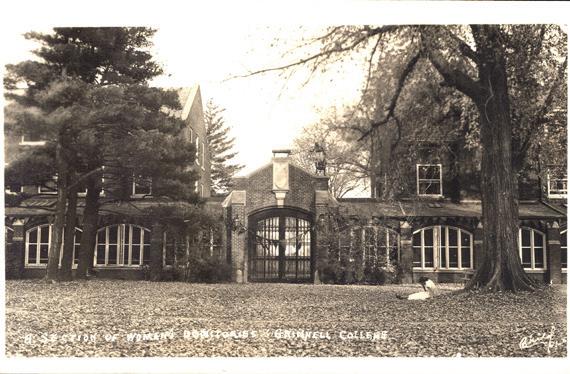

For Lucy Polyak `23 and Craig Quintero, professor of theatre, dance and performance studies, their Mentored Advanced Project (MAP) represented an opportunity to reignite a sense of belonging and community on campus post-pandemic. Given the chance to direct a production of “The 25th Annual Putnam County Spelling Bee”, Polyak described her project as a formative and meaningful capstone to her time as a student.
However, cases like Polyak’s have become less common as Grinnell faculty struggle to justify supervising MAPs during the semester due to a compensation policy from 2016.

The MAP program allows students to work on advanced projects for four, six or eight credits under the direct supervision of a chosen faculty member to gain research skills and hands-on experience in their field of interest.
A change in policy from 2016 no longer financially compensates professors for supervising MAPs during the semester. Michael Latham, former dean, said that they wanted to recruit a more robust faculty pool by making the College’s sabbatical policy more competitive with other schools through the reallocation of compensation for MAPs conducted during the semester. The current compensation model uses MAPs and other research programs to measure the professor’s work with student research as part of the application process for faculty sabbatical leave.
Due to these changes to the compensation model, faculty have found it harder to justify the extra labor of working with students on MAPs during the semester. Edward Cohn, professor of history and European studies, noted that this policy seemingly exists due to differing labor expectations. Students are given course credit for MAPs and complete those projects alongside their other classes, contrasting the apprenticeship style of research that
occurs over the summer and necessitates a stipend.
“The idea is that that [summer stipend] should be enough to cover your expenses and not much more than that. Whether it works, though, in practice, I’m not completely sure,” Cohn said.
The previous compensation model allowed professors to receive payment for involvement in MAP research or convert that labor into course credit. A faculty member’s participation in six MAPs supplemented a class the professor would no longer have to teach the following semester. 12 MAPs could cover 2 courses from a faculty member’s annual contract, which allowed them to take a full-year paid sabbatical.
Andrea Tracy, professor of psychology, researches the neuroscience of ingestive behavior, and noted how assisting in student research can contribute heavily to a faculty member’s access to a full-year sabbatical.
“You’re supposed to demonstrate that you have done research with students,” Tracy said. “It doesn’t necessarily have to be MAPs, although MAPs are the easiest way to demonstrate that.”
lege, approves MAP applications and said that the lack of compensation is consistent with the College’s academic outcomes.
“Change is always hard. There were some individuals who definitely preferred the older model and others unhappy with that shift,” Hansen said. “I would say that it was a change that the institution needed to take.”
The policies determining faculty MAP credits made it difficult to consistently plan for when professors would be leaving for their sabbatical, and the office of the registrar faced challenges planning upcoming semester courses. The transition from trading MAP credits for course releases happened in phases so that faculty could use their course releases or opt for payment. Cynthia Hanse, associate dean of the Col-
The current model imposes stricter limitations on the types of research available to students. Since applications require a relevant faculty member, students with novel research ideas that do not currently exist at the College are more likely to join a professor’s existing research instead. Karla Erickson, professor of sociology, notes that specialized mentorship in unfamiliar fields of study are typically more challenging to undertake during the academic year.
“I have students all the time who come to me with this great idea. There’s no way I can do that project with [students].” Erickson said. “The only way I’ve been able to find that works for me is if I can get a group of students to think on
Community: Women’s History Month
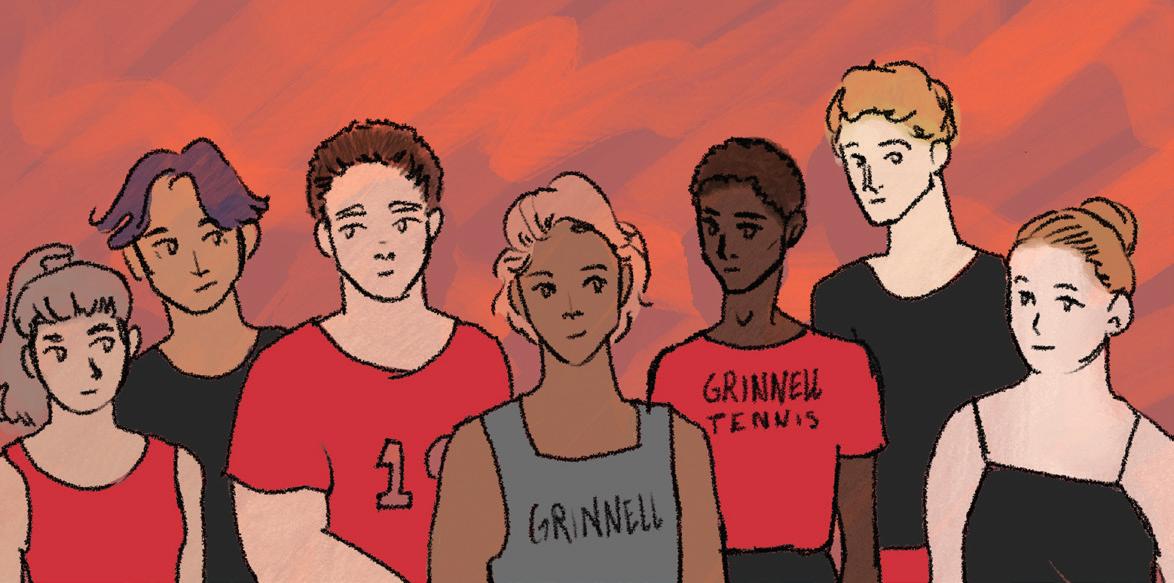
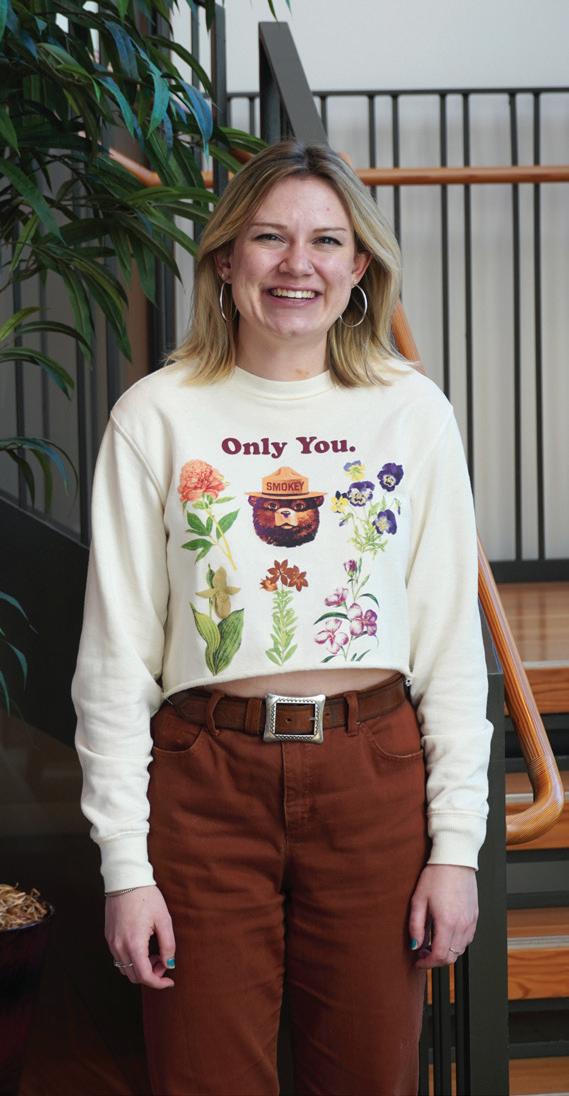
I can’t do it out of the generosity of mine and then stil find time to do my scholarship.
Karla Erickson Professor of SociologyOWEN BARBATO Lucy Polyak `23 directed a musical production for her MAP. CORNELIA DI GIOIA
Uncovered lawsuits reveal Title IX mishandlings Map funding changed
Voices, a group urging reform of the College’s Title IX process. According to a 2015 Huffington Post article addressing sexual assault at the College, the process sometimes resulted in penalties some students called “a joke.”
John Doe v. Grinnell College
On March 2, 2017, a former student under the pseudonym John Doe filed a complaint in the Southern Iowa U.S. District Court against Grinnell College alleging that the College violated Title IX by engaging in sex discrimination against him and breaching the terms of its sexual misconduct policy.
Doe was dismissed from the College in 2016 following two separate accusations of sexual misconduct from female complainants. Doe’s 2017 appeal to the College was denied.
After over two years of case proceedings, the court found in July 2019 that Doe produced evidence sufficient for a reasonable jury to find the College liable on both counts. The case proceeded to a jury trial set for March 3, 2019.
According to the July order, the court found the potential for gender bias from the fact that Ternus wrote in the final adjudication that because the second complainant ran out of birth control, there exists more support for the complainant’s assertion that she did not want to have sex.
According to the same document, the court also found that Ternus did not consider, analyze or note statements made by the complainant to investigators that while with Doe, she “should have just stopped and left … but I turned back towards him and I — I responded — I like kissed him.”According to the document, Ternus also did not address in the adjudication a comment the complainant made that she had made requests to Doe that he could “be more rough” with her, which the court found to be evidence for sex discrimination against Doe.
The court found the fact that the second complainant was allowed two support persons during her investigatory interview while Doe was told he could have only one to be sufficient evidence for Doe’s allegation that the College violated its sexual misconduct policy.
The court also found credibility in Doe’s evidence as the initial Notice of Investigation he received informing him of the investigation did not accurately state the conduct he was being investigated for.
Doe and the College settled out of court on Aug. 16, 2019. The amount has not been disclosed.
Peter Moe v. Grinnell College
On Feb. 19, 2020, a second plaintiff under the pseudonym Peter Moe
filed a complaint against Grinnell College alleging the College violated Title IX by engaging in sex discrimination and breaching the terms of its sexual misconduct policy, the same allegations as Doe. Moe had previously been dismissed from the College after being found responsible for three counts of sexual assault.
The court cited Ternus’ language in her adjudication as sufficient for a reasonable jury to determine sex discrimination. Ternus reasoned that because Moe had previously kissed a complainant on the cheek, he must have intended to engage in further sexual activity with her, and thus he was not credible in denying that he intended to engage in sexual activity. Ternus later wrote that Moe’s “acknowledgement that [he] may have had an erection that evening is inconsistent with [his] denial of any sexual interest in [Complainant 3].”
Moe submitted as evidence for sex discrimination details from a 2015 misconduct case adjudicated by Ternus. The case involved a female student alleging another female student of sexual assault.
In the case, Ternus said she found both female students “credible and sincere in their accounts of what happened,” but did not explain in the adjudication why she found either student credible, according to court documents. Ternus later relied, in part, on the alleged perpetrator’s credibility as reason for finding there was not enough evidence that the complainant did not consent.
The court found evidence of procedural oversights that bolster the conclusion that a reasonable jury could find the College discriminated against Moe based on sex. During the lawsuit, Moe submitted evidence that the Husch Blackwell investigator did not interview witnesses who could have corroborated Moe’s testimony, and Ternus did not have sections of the transcript in Moe’s interview with the investigator.

The court also cited evidence that the Husch Blackwell investigator received no training on the College-specific Title IX policy, despite College policy requiring investigation by “a trained investigator.”
A jury trial was set to begin Nov. 15, 2021, but the case was dismissed with prejudice on Sept. 23. The terms of the dismissal stipulate that Moe cannot file subsequent suits against the College on the same claim. No settlement notice was filed by Moe or the College to the court.
Christopher Roe v. Grinnell College
A third plaintiff with the pseudonym Christopher Roe filed a complaint on March 23, 2020, against the College alleging the same violations of Title IX and breaches of the College’s

sexual misconduct policy as Doe and Moe. In April 2018, Roe was found responsible for a sexual assault that occurred over two years prior, and he was banned from campus with a 48hour notice, according to court documents. The ban held until after the female complainant, one year below Roe, graduated.
According to Roe’s complaint, the female student had first named the alleged assailant as someone other than Roe, a fact which Roe alleges was not questioned by either the Husch Blackwell investigator or Ternus.
Roe’s complaint further alleged the Husch Blackwell investigator did not question witnesses at the request by the complainant; that Roe did not have the option to review the preliminary investigation report; and that he was not fully apprised of the allegations made against him until he met with the investigator. Roe also submitted cases where he alleges Ternus treated female respondents more leniently than male respondents. According to the complaint, the only sexual misconduct cases Grinnell informally resolved and subsequently reopened for a formal resolution from Jan. 1, 2014 to June 30, 2018 involved male respondents. In one instance, Roe alleges that after Ternus had found a female student responsible for sexual assault, Ternus refused a request by the complainant to place a notation on the alleged assailant’s transcript because Ternus thought it would impede the student’s educational and career goals.
A jury trial was set for Nov. 15, 2021. The case was dismissed with prejudice on Aug. 10, 2020
Title IX Coordinator Bailey Asberry did not respond to a request for comment on whether the College has ended their engagement with Ternus or Husch Blackwell, but she did write in an email to the S&B that “the College engages external investigators and adjudicators appropriate to the circumstances. We do not name a specific firm or individual in the policy as who we engage may vary based on factors such as workload/availability or potential conflict of interest.”
As of March 1, 2023, Title IX coordinator training materials listed on the College’s “Title IX Information” webpage include a 2022 Husch Blackwell copyright label. Ternus and Husch Blackwell did not respond to requests for comment.
Asberry declined to answer any questions related to litigation. Asberry did not respond to a request for comment on if non-disclosure agreements or confidential clauses prevent her from speaking, but she wrote that similar to discussions of Title IX cases, discussions of lawsuits violate the The Family Educational Rights and Privacy Act (FERPA).
Faculty struggles to plan around Working Differently Day
Gregg-Jolly all said that more extensive surveying should be done to find a system that proves effective for everyone.
Many students feel that the most meaningful reform would be to use the extra days to create a three-day weekend. “Using Mondays and Fridays as Working Differently Days would be much better,” said Guanzheng Sun `25. “Putting them with weekends would create opportunities for traveling to see friends and family, or simply catching up on sleep and work.”
my own questions with me.”
These changes have also shifted the MAP application process and how faculty members recruit potential mentees. The science division recruits MAP applicants through a division-wide application process, where students can access summaries of existing research opportunities across the division and formally apply for a MAP. This system has also proven necessary for professors in other divisions, which has made the availability of MAPs more competitive for students.
Karla Erikson Professor of Sociology“The only problem is that it’s uncompensated, so it’s mainly over-
By Taylor Nunley nunleyta@grinnell.edutime,” Erickson said. “I can’t just do it out of the generosity of mine and then still find time to do my scholarship, so for me, my maps have to advance my own scholarship.”
Differences in access to funding resources can also present disparities in student opportunities. MAPs focusing on the social studies division and independent majors constituted 9 overall approved MAPs this semester, while 19 applications were geared toward the sciences.
MAPs in the STEM fields can currently access external grants funded by alumni donations, which allows the program’s operating budget to fund more MAPs outside of the program’’ operating budget. These grants, like the Cech Scholars program, are exclusively donated to support faculty-mentored summer research opportunities for specific groups like BIPOC students and first-generation students.
“It’s really uneven in any given year,” Erickson said. “Our most highly qualified social majors may not do a map just because it doesn’t line up or their professors are already pursuing something that didn’t interest them.”
“As opposed to just waiting for a MAP to appear, go for it.” Polyak said. “You have to create the opportunities that you want.”
UGSDW Bargaining
would consider a gradation based on hours worked.
At the collective bargaining session on March 2, the Union of Grinnell Student Dining Workers (UGSDW) bargaining team and the College’s bargaining team negotiated a new proposal concerning leaves of absence and revisited issues surrounding health and safety in the workplace.
During the meeting, the UGSDW bargaining team expressed concerns over the current process of progressive discipline for student workers before being terminated. “Let’s give them [the student workers] a chance to respond … before that action is taken,” said Isaiah Gutman `23, a member of the UGSDW bargaining team.
Both teams also discussed the right to have a union representative or steward at this disciplinary meeting, to which the College’s bargaining team took no issue. The College proposed including language saying, “Workers have the right to not have a union representative present.” UGSDW said they would have a response to this clause at the next meeting.
The UGSDW bargaining team also reiterated their concern over the Just Cause process; they said they would speak more fully on this in another session.
The College also brought up problems with not needing to provide documentation for leaves such as paid time off and bereavement leave.
The respective bargaining teams also referenced a section in the new UGSDW proposal which outlines leave for municipal obligations, specifically elections. The College said UGSDW’s current language implies that all workers can take a paid day off to vote; the UGSDW bargaining team disagreed and said this would only be necessary if a scheduled shift interfered.
want is for them to be so disruptive that people feel that they’re not useful.”
Sherif Abdelkarim, professor of English, said that he has appreciated having Working Differently Days to grade, host guest lectures and invite students to do field work, but he currently sees greater benefit in allowing faculty to determine when and how to implement these days.
“The idea of a faculty member having the choice to ‘work differently’ according to the dates that work best for their particular class is a great idea. Frankly, I don’t see any disadvantages to that model,” said Abdelkarim. However, when it comes to the current structure, Abdelkarim said that having set dates can get complicated.
Other faculty members have voiced similar concerns. Leslie Gregg-Jolly, professor of biology, said
that she is ambivalent about Working Differently Days. “These days are a pain in the neck to plan curricularly.
We put so much time into planning the semester and making sure that students aren’t overwhelmed,” she said. “And then to just eliminate two days of class is a big deal.”
Gregg-Jolly said that the College should look at workload more broadly.
“If we limit work, students may possibly be less stressed, but then they also may not become the superstar alumni we’ve been able to foster,” she said, pointing to the frequent cancellation of science labs on weeks with Working Differently Days. “So at what point is there a trade off if we diminish the academic program?”
Arner said that while the majority of the feedback has been positive, the primary concern is that these days simply relocate work rather than eliminate it. Considering the mixed reviews across campus, Arner, Abdelkarim and
Sira Nassoko `24 also said that the days could be placed more effectively. Since they are placed mid-week, Nassoko has found that they essentially become reading days. “It’s a nice break from classes, but I don’t find that my day is any less busy.” Furthermore, Nassoko said that professors often still assign work. “I’ve had due dates on some Working Differently Days, and I know some friends have also had work either assigned or due on these days,” Nassoko said.
“It’s hard to gauge in the moment how effective these Working Differently Days are,” said Arner. “Ideally, we will look back in May and determine whether they made a difference.”
The second Working Differently Day is scheduled for Wednesday, April 26. The Grinnell College Committee on Academic Standing is also planning two Working Differently Days each semester in the 2023-24 academic calendar.
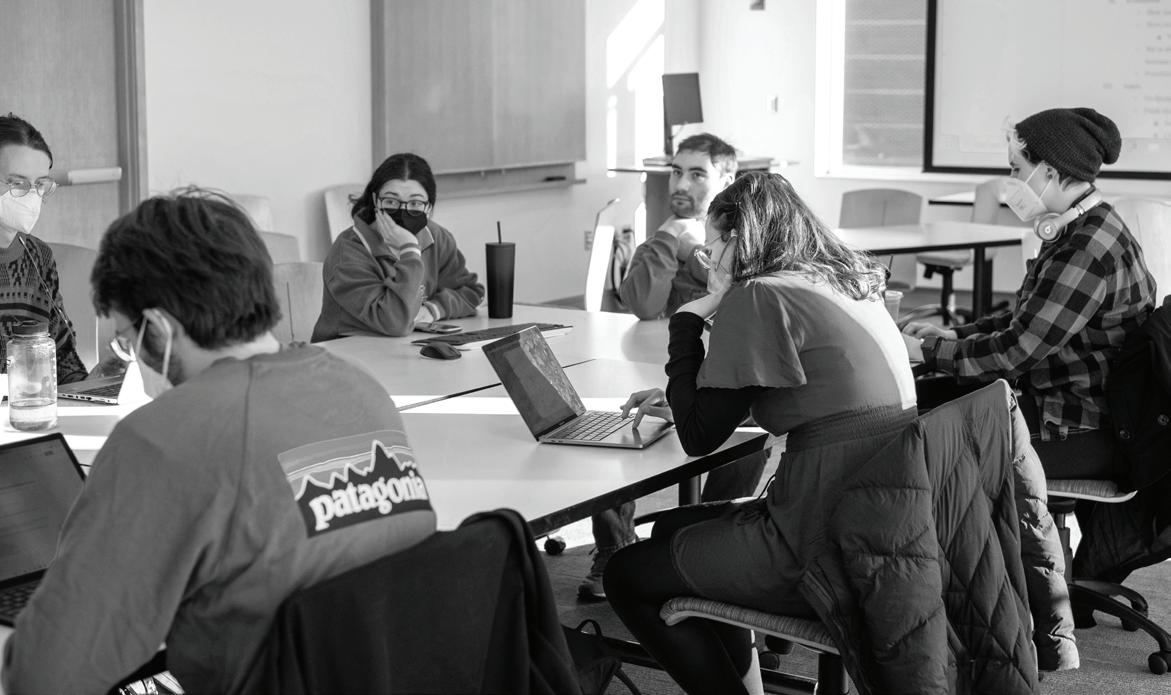
UGSDW’s new proposal on leaves of absence yielded several concerns for the College. Similar to their healthcare rebate proposed at last week’s session, the College said the current benefits outlined in UGSDW’s proposal far exceed what non-student workers receive. Currently, UGSDW’s proposal allots 8 hours of paid time off to all student workers for any reason.
The College debated the phrase “any reason” and the possibility of students who work little hours being able to take off 8 hours. UGSDW said they
The last section concerned health and safety. UGSDW brought forth issues with reporting COVID-19 in workplaces; the College said that reporting each case could violate privacy issues in small groups. Anonymous notifications were suggested as a counter. Finally, both teams negotiated workplace protections for disabled workers. The College agreed there is a need to put certain requirements — like how long a worker will be standing or weight lifted — in job descriptions. But they also stressed that students understand the requirements of different on-campus jobs and said many positions already have accommodations in place. The UGSDW bargaining team said the need for these protections in the contract is for students to understand they could utilize them.
Bargaining will continue on Thursday, March 9 at 4:15 p.m.
Correction from last week’s bargaining article: The College bargaining team’s proposed change to a base wage of $10.75 would actually only affect Level I jobs, not all jobs on campus. Only 10% of student workers would be paid at Level I wages according to the College’s proposed pay tier system.
Our most highly qualified social majors may not do a MAP just because it doesn’t line up or their professors are already pursuing something that didn’t interest them.
Campus Quaker Meeting Worship Group hosts silent meetings to encourage reflection
Banfield said they have found a spiritual home within the group during their time at Grinnell. Despite growing up Catholic, Banfield said Quakerism aligns with their beliefs of pacifism and respect.
“I think they’re just good things to live by, even if you’re not a Quaker,” Banfield said about the general tenets of Quakerism.
inence to their abolitionist ideologies during the 18th and 19th centuries. He said this continued in the 20th century as Quakers were stark conscientious objectors to the Vietnam War.
By Kailee Shermak shermakk@grinnell.eduOriginally started in 1979, on-campus Quaker silent meetings have seen an uptick in attendance over the past three weeks. The group gathers twice a month for a silent hour of reflection as a way to connect with their spirituality and have a reprieve from day-to-day life.
Under the umbrella of Quakerism, there is a wide variety of beliefs concerning the nature and existence of God and the spiritual realm, according to Bob Cadmus, professor of
physics, an involved member within the Campus Quaker Meeting Worship Group.
Rather than debating the specifics of if and how a God exists, Quakerism seeks to slow down and center oneself with simplicity, Cadmus said.
Darius Hills, associate professor of religious studies, explained that traditional Quaker worship services are spent in silent reflection. He said the service remains quiet unless a participant feels moved by a spiritual force to say something. Cadmus confirmed that the Quaker silent meetings on campus follow this same format.
“The idea is everyone has an equal opportunity to hear God speaking to them, but you have to listen,” Cadmus said about the reason for silence during Quaker meetings.
Beyond the spiritual aspect of the Quaker meetings, Kelly Banfield `24 said they offer a refuge from the daily stresses students face. Cadmus and Banfield both described the meeting as a meditative time, allowing participants to slow down.
Regarding benefits beyond a spiritual experience, Cadmus said, “there are other things involving community and learning to listen to yourself.”
The group organized a Quakerism 101 session in February to introduce the core beliefs of the religion. This meeting had a record turnout of 17 students compared to previous meetings’ attendances of two students, according to Cadmus. Banfield said that this session explained the history of Quakerism, as its founder George Fox disagreed with the performative nature of Christianity via excessive worship, clothes and buildings. Since Fox’s original beliefs, the Quakers have a long history of pacifism and social justice that has been continued throughout American history.
Hills explained that the Quakers’ beliefs were often displayed through their actions and habits. He said Quakers have historically dressed in simple black and white clothes, spoken in plain words and abstained from alcohol.
“The notion that everybody has a divine light within that allows them to be able to feel and sense the presence of God” is a standout belief of Quakers, according to Hills.
Cadmus and Banfield said they are encouraged by the increased interest in Quakerism on campus. They said their goal is not to convert people, but rather to just offer an option that people can take or leave.
Within the United States, Hills attributed the Quakers’ rise to prom-
Quaker silent meetings occur every first and third Sunday of the month in the Center for Religion, Spirituality and Social Justice Prayer Garage and are open to anyone interested.
History Takeover: The winding path of coeducation at Grinnell

There is a short and optimistic version of the story of coeducation at Grinnell College — the school began accepting women in the 1860s and expanded extracurricular opportunities for women a century later, so that by today, it has become truly coeducational.
That story is not necessarily wrong. Yet, it obscures the nuance of coeducation at Grinnell by reframing it as a natural, inevitable outcome. In fact, the process has sputtered along in leaps as well as with backslides, responding to particular incentives at particular times.
Grinnell has admitted women since the Civil War, according to Joseph Frazier Wall in “Grinnell College in the Nineteenth Century.” Most young men were drafted to fight in the war, so the school allowed women to enroll in order to boost enrollment numbers.
In 1865, Joanna Harris Haines became the first woman to graduate from Grinnell College. However, the College perceived “ladies’ education” as inferior, and despite earning a diploma, Haines did not receive a Bachelor of Arts, or any degree, for her efforts. Over the next half century, fe-
male enrollment developed unevenly.
According to Professor Martha Foote Crow — one of the first women in the country to receive a doctoral degree and a vigorous proponent of coeducation at Grinnell in the 1880s — an average of five women graduated Grinnell each year for the two decades following the 1860s. After, the pace accelerated so that women accounted for roughly half of the graduating class by 1920, according to Tamara Beauboeuf, professor of gender, women’s and sexuality studies.
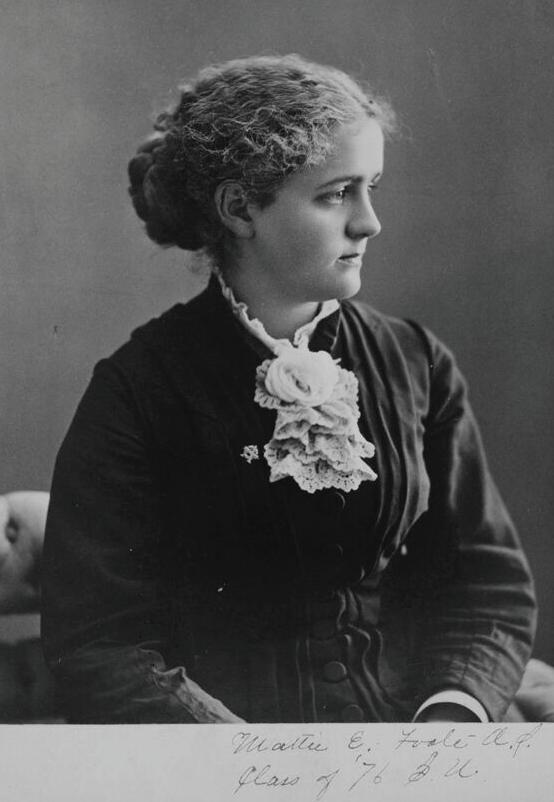
While women gained full access to academic offerings during this period, residential life remained segregated. Men lived in north-campus dorms, while women resided in south-campus ones. Both halves had separate student governments, recreational facilities and extracurricular activities.
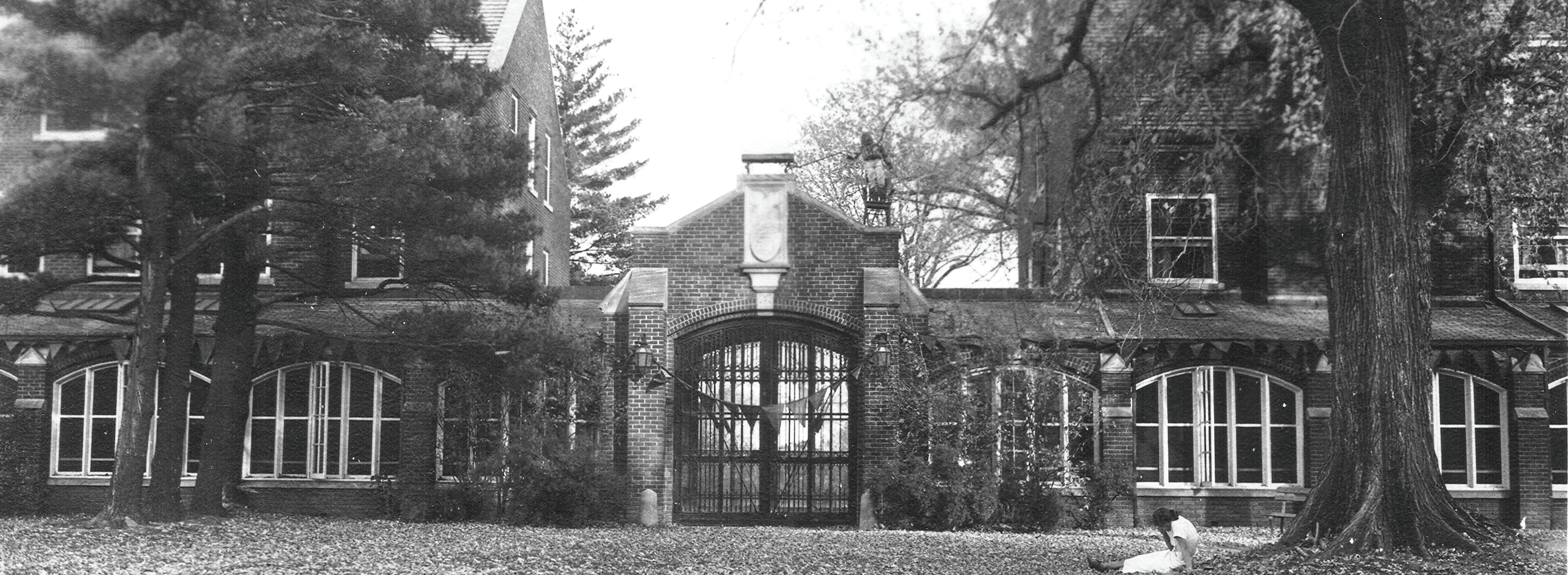
The College worked hard to maintain the division. In the paper “The Transition to Coed Residential Life at Grinnell College,” Eli Zigas `06 explains that the school locked the south-campus loggia every night so that men and women could not interact unsupervised.
en. Beauboeuf emphasized how the deans of women represented female voices on campus.
Referred to as “architects of belonging” by Beauboeuf, these administrators guided women through a male-dominated space by speaking on their behalf, pressuring the administration and implementing extracurricular events.
In the 1960s and 1970s, second-wave feminism engendered coeducational reforms at hundreds of college campuses including Grinnell. For instance, as Title IX became law, women gained access to athletics.
Likewise, the longstanding policy of residential separation ended. Zigas finds that there were no coed dorms in 1967, but by 1974, only Dibble Hall and Smith Hall were single-sex dormitories. And with the change in location, the student government became the Student Government Association (SGA) known today, with equal chances for representation for students of all genders.

However, Scarlet & Black papers from this time period introduce another layer of complexity to the narrative. By and large, students did not premise their support of dorm integration on gender equality — they instead protested rules against opposite sex visitations at night.
Students essentially argued that residential separation rules stopped them from having sex. After years of op-eds and student government resolutions, the College relented in 1968.
In 1972, the SGA eliminated a position reserved for women, turning it into the vice presidency. This decision received little attention, meriting seven short sentences in the SGA meeting minutes.
Coeducation is an ongoing challenge. The uneven dropout rates in STEM fields prove that women continue to face challenges in accessing
higher education, including at Grinnell. When understood through the lens of intersectionality, the picture dilutes further: Edith Renfrow Smith `37, the first Black woman to graduate Grinnell, did so 72 years after the first white woman. The more one looks into coeducation, the less short, optimistic and simple the story turns out to be.
The College also had separate versions of student affairs, headed by the dean of men and the dean of wom-
Even then, the story was not complete, as Beauboeuf explained, “Making [Grinnell] one campus means that it became a men’s campus again.” The loss of a space specifically for women, and thus the loss of the dean of women, carried negative consequences.
The idea is everyone has an equal opportunity to hear God speaking to them, but you have to listen
Bob Cadmus Professor of Physics
I think they’re [pacifism and respect] good things to live by, even if you’re not a Quaker.
Kelly Banfield `24
Grinnell businesses
kick off Women's History Month
By Cadence Chen chencade@grinnell.eduIf you walk into one of Grinnell’s local businesses this month, your direct eyeline may land on boxes of maxi pads and tampons.
As a part of S.H.E. (Supporting Helping Empowering Women) Counts’s initiative to make period products more accessible, 16 businesses in the Grinnell area kicked off Women’s History Month with the Women + Friends: Women’s History Month Night Out event on March 1.
From 4:30 to 6:00 p.m., participating local businesses, the majority of which were womenowned or women-operated, stayed open later to allow for patrons to shop deals.
People were encouraged to drop off pads, tampons, panty liners, menstrual cups and other period products. From 5:30 to 7:00 p.m., local wine bar Solera was open for happy hour and raffles with local goods for people who donated period products or at least $5 to the supply drive.
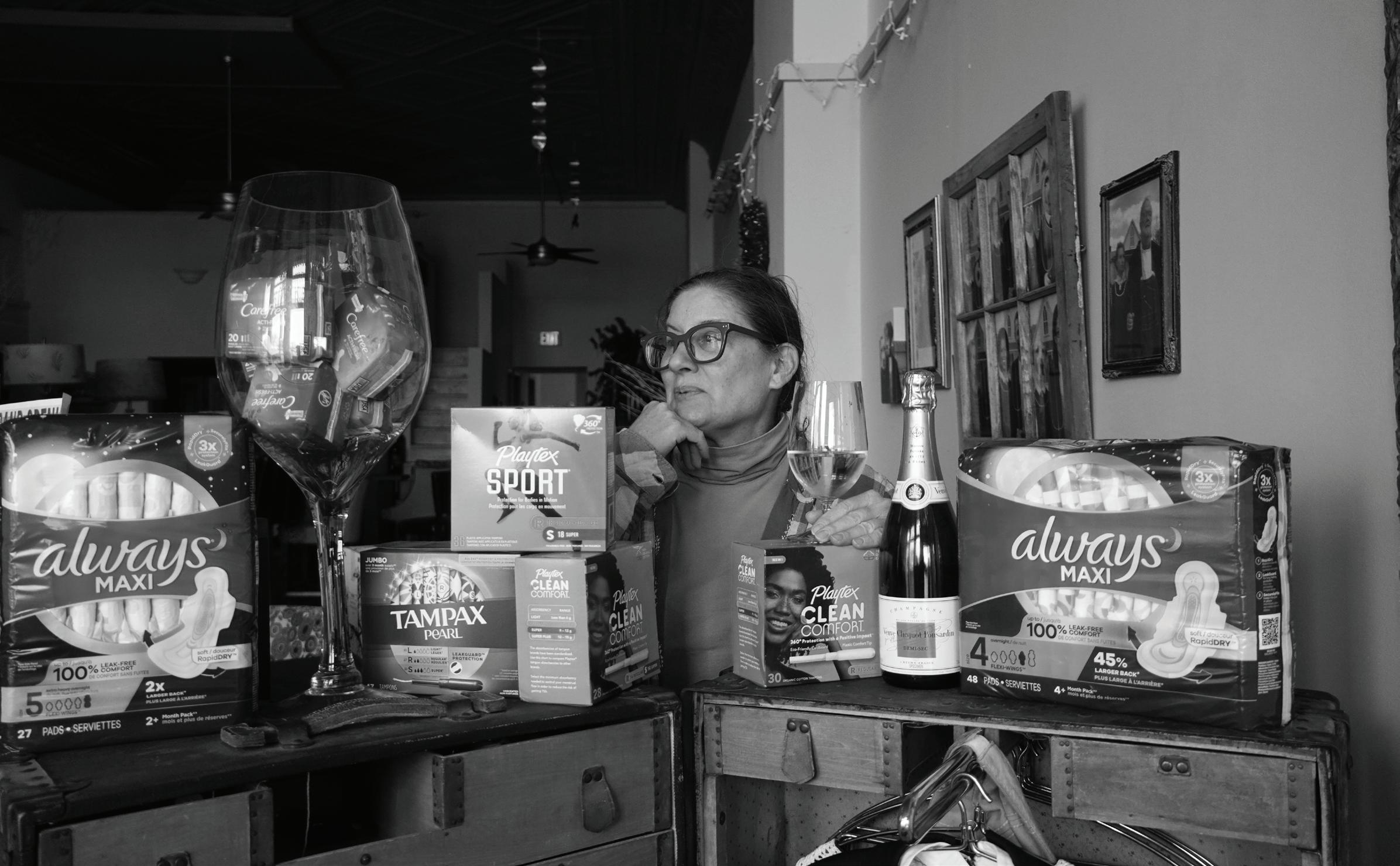
Donations will later be made to the Grinnell Middle School and Grinnell-Newburg High School, Mid-Iowa Community Action (MICA) Food Pantry and Drake Community Library. The drive will last for the month of March.
Though not all the participating businesses are women-owned or women-operated, a majority of Grinnell’s retailers fall in this category, and there is an even
split between women-owned and men-owned businesses, according to Kendra Vincent, member engagement coordinator of the Grinnell Area Chamber of Congress (GACC.)
There are also 16 flyers highlighting different iconic Grinnell woman posted on the doors of the 16 participating locations. This was
done with the help of the Grinnell Historical Museum.
“This was just kind of a nice way to highlight the impact that some ladies had in our town,” said Vincent.
For example, one of the flyers refers to Edith Renfrow Smith `37, the first Black woman to graduate from Grinnell College.
In collaboration with the S.H.E. Counts program, a part of the Claude W. and Dolly Ahrens Foundation, the GACC and insurance company Grinnell Mutual organized this event. Vincent said that some S.H.E. Counts board members are employees of Grinnell Mutual, which is what spurred this collaboration.
Lori Vos, owner of Lorelai’s Giftshoppe and Village Decorating Studio, has been involved in Grinnell retail for over 40 years. As a current board member of the GACC, she said that they have been discussing a way to promote local businesses for “this slower time of the year.” After the end-of-year holiday shopping season, Vos said that Grinnell businesses have historically found a
decrease in business.
The GACC thought that a collaboration with S.H.E. Counts would be “the perfect fit,” according to Vos. She also said that she has observed an uptick in these kinds of local business promotional events over her time as a business owner in Grinnell.
“I think it's a great seed to be planted,” Vos said about the supply drive.
Colleen Klainert, owner of Solera, offered free wine to those who attended the event. She said that a friend, who is a frequent Solera customer and a Grinnell Mutual employee, brought this event up to her, and so Kleinert offered her business.
The week before the event, Klainert positioned boxes of period products to be right at eye level when customers walk through the door of her business. She also had a picture of a maxi pad on the cover of her pizza menu, which acted as an invitation to the Women + Friends event.
She said that the conspicuous presence of period products has made some patrons uncomfortable.
“Hey, you know what? You think it's uncomfortable to look at?” said Klainert. “Try needing one and not having one. That's uncomfortable.”
However, she also said that her customers have been engaging in conversations about period products and that this drive has raised awareness for this need. In particular, Klainert noted a conversation she had with a friend about how some people who are on their period skip school because they do not have access to the supplies they need.
Klainert said that since the Trump administration, which she called a “big wake up call,” she and her friends have been trying to find more ways to help people in the community who are excluded from governmental assistance.
“If you can't count on the values of your government, you better count on the values of your neighbors,” Klainert said. “And I got really good neighbors.”
Meet the Bartenders: Eagles Edition
By OliverThe Fraternal Order of Eagles is a national non-profit fraternal organization that raises money for various local and national charities.
According to the Fraternal Order of the Eagles's website, some of their notable societal contributions include founding Mother’s Day, Social Security and funding the $25 million Fraternal Order of the Eagles Diabetes Research Center at the University of Iowa.
One of their many locations happens to be right here in Grinnell. Located at 616 Fourth Ave, Eagles is a popular spot for residents and students alike. Meet Troy Kingery and Chris Mcvay, two of the bartenders who work at Eagles:

Troy Kingery
Troy Kingery was born and raised in Grinnell, Iowa. He graduated from Central College in 1993. He has been a bartender in Grinnell since he graduated college and has been working at Eagles for the last 20 years.
Prior to working at Eagles, Kingery was a bartender at the Down Under Pub, which was located in what is now Canary Underground.
“We used to host the College's 100 days party [there]," Kingery said. “So that was always fun. It was in a basement, so the ventilation was really poor. And there'd be so many people in there and it would get so hot and sweaty. And just the whole atmosphere would be so humid that by the end of the night, my shoes would be red because the paint would literally be coming up off the floor,” Kingery said.
Kingery also said that he first got introduced to the Fraternal Order of the Eagles by his father, who was a Trustee at the Eagles.
Kingery explained that a Trustee helps in the maintenance of the club and its employees.
has spent bartending, he said he has noticed that a lot of the drinks from the 90s have disappeared and his job responsibilities have shrunk. Kingery’s duties used to include tasks like sweeping, mopping and cleaning the bathrooms.
“Now it's just basically you get done, you wash the dishes, you put the stools up and go home go home, they have somebody else take care of the cleaning,” Kingery said.
As far as drinks go, Kingery said that Tom Collins was a very popular drink in the 90s.
mainly sees older adults come in, and on the weekends, it is more of a mix of both old and young groups.
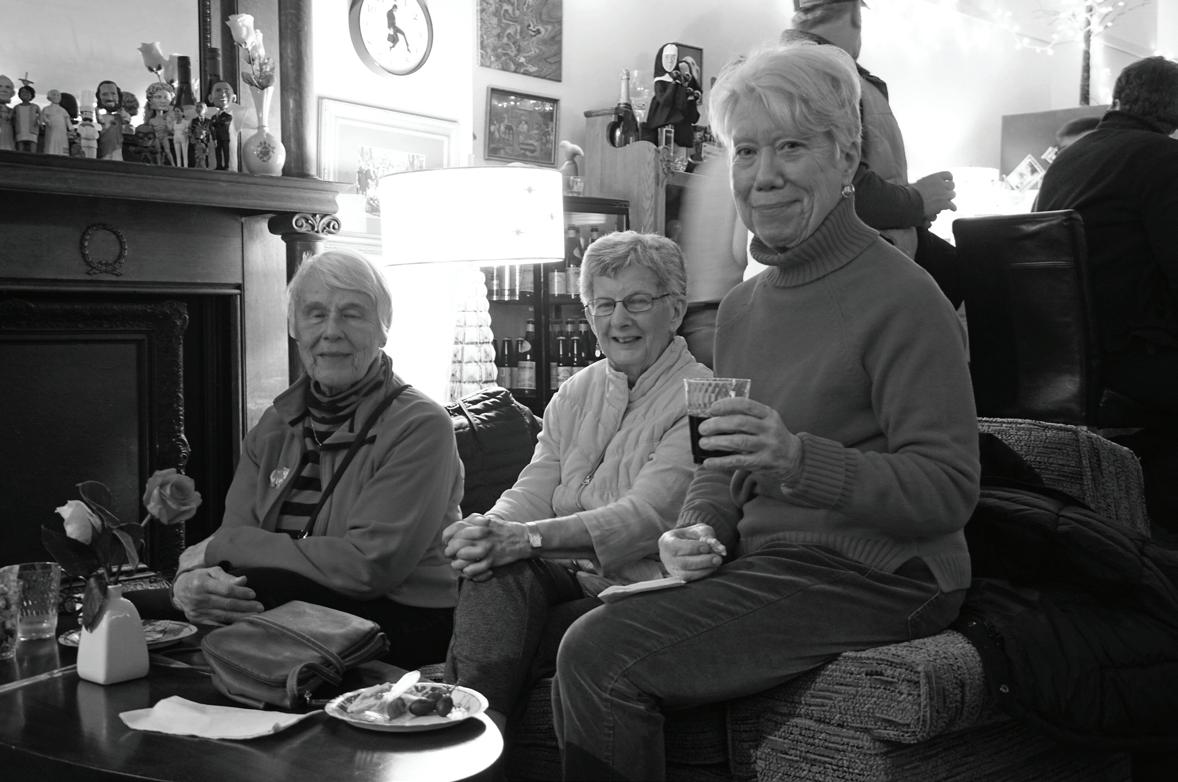
While he was in high school, Kingery said “I did a public service announcement [for Mother’s Against Drunk Driving] that was ‘Make 1993 a class act: don't drink and drive,’ and now I am a bartender.”
Chris Mcvay
Chris Mcvay has lived in Grinnell since he was six years old. Like Kingery, Mcvay ended up at Eagles through his connection with a Trustee of Eagles.
fundraising events that Eagles hosts, and now is the main bartender during the week.
As far as the job itself, Kingery said that it is pretty easy. “You basically just keep everybody happy,” Kingery said. “Make a lot of drinks.”
Over the 30 years that Kingery
“And now I can't tell you the last time somebody asked me to make them a Tom Collins,” Kingery said.
Bartending at Eagles offers Kingery the chance to meet people from different age groups. Kingery explained that during the week he
Mcvay said that he met a Trustee while working at Jeld-Wen, an interior door manufacturer in Grinnell. After Mcvay asked if he could help out at Eagles, he was offered a job soon after. Mcvay started out by helping with the
Chris Mcvay BartenderMcvay said he enjoys working at Eagles because of the laid-back environment. Mcvay said that Eagles doesn’t have traditional bosses who order you around and oversee your job. The Trustees, who are technically Mcvay’s bosses, don’t interact with employees as a boss, but rather as a fellow member.
While there is the occasional barfight, Mcvay said that 99% of the time everyone is just having a good time. Mcvay has gotten to know a lot of customers and bartending feels more like hanging out with friends than a job.
“There's a bunch of friends and family I'm hanging out with every night,” Mcvay said, “It really doesn't feel like a job.”
“I just love bouncing around behind bars,” Mcvay said, “I pray that that gets me somewhere in life. My goal is to go to Chicago.”
Mcvay recommends the Gummybear, which is made with cherry vodka, peach schnapps, Sprite and pineapple.
I love it. It's really nice to have my bosses not be people above me but be just my customers that come in doing what everyone else wants to come in and do, which is have a good time.
There's a bunch of friends and family I'm hanging out with every night ... It really doesn't feel like a job.Chris Mcvay Bartender
"To write and create are not the same thing": Writers@Grinnell welcomes John Lee Clark
By Krista Spies spieskri@grinnell.edu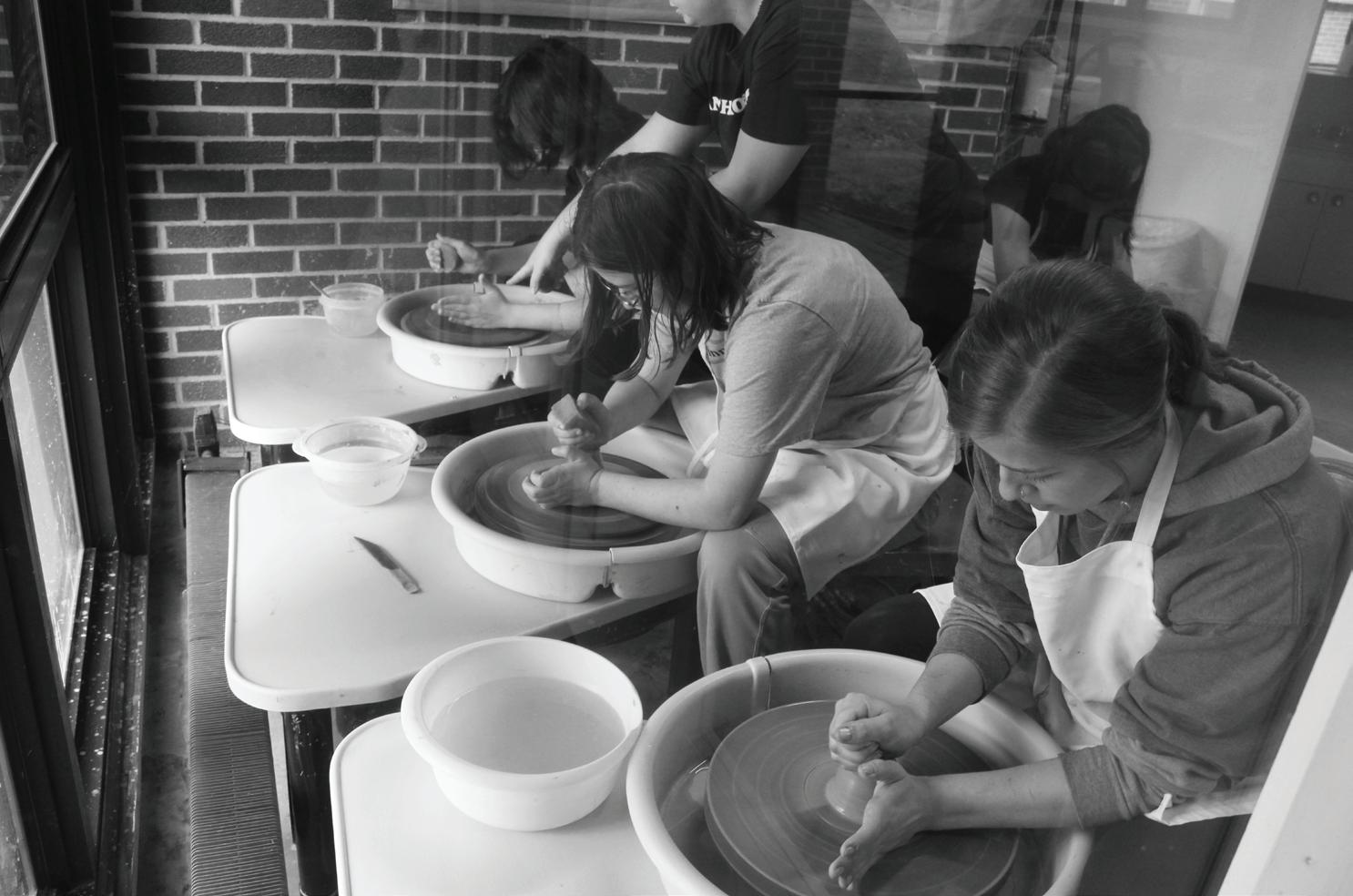
This past Tuesday, Writers@

Grinnell welcomed John Lee Clark to share his 2022 book of poems “How to Communicate,” which, like many of his works, takes inspiration from his life as a DeafBlind writer. Clark is not only an award-winning poet, essayist and translator, but he is also a leader in the world of protactile, a touch-based language created by and for DeafBlind people. Protactile originated in 2007 as a means for DeafBlind people to interact directly with each other
instead of through interpreters, as most preexisting sign languages relied largely on visual cues.
During the Writers@Grinnell event, Clark was seated with two interpreters, Hal Anderson and Ahyicodae (Iko), who vocally translated the writer’s communication from protactile. The three, along with Sejal Sutaria, assistant professor of English, and various crowd volunteers, formed what Clark described as a “cluster.” An American Sign Language interpreter, Julia Lyttle, also accompanied the reading.
The concept of a “cluster” holds an important place in protactile communication because of the reciprocity and necessary physical closeness of participants — while protactile does not lend itself to large group communication, a small group can communicate in protactile if they are able to initiate shared physical contact with such a cluster.
Within this format, Clark took what he called a “hybrid” approach to the reading. In addition to sharing his work through interpreters, he brought and shared objects important to his life and mentioned in his poetry. These included a braille slate, the hospital anklets worn by his twin sons after their premature birth and artwork by a DeafBlind artist. These objects were
passed between audience members to touch and explore, echoing Clark’s experience of perceiving the world through his hands.
In an email to the S&B, Clark described how he got into writing. He wrote that it is a long story “involving many threads that somehow converged, looped around my hands and made them write.” One of these threads was the gradual deterioration of his vision as he was born deaf but became blind as an adolescent. Clark wrote that as he had to find books with larger fonts from bargain tables and used bookstores, he began consuming a “more eclectic platter” of literary works, including poetry.
“There are not many contemporary DeafBlind writers, so my task is a more challenging one — breaking new ground, creating. To write and create are not the same thing,” Clark said.
Two of Clark’s other works include the 2008 chapbook of poems “Suddenly Slow” and the 2014 essay collection “Where I Stand: On the Signing Community and My DeafBlind Experience.”
“For poetry, it was harder to push back on the canon and make room for poems that truly spoke to my identity and life experience,” he wrote in comparison to his experience with
essay-writing. “In many marginalized literatures, the essay, or nonfiction in general, is the first to really speak up and to refuse to cater.”
However, as he focused on works from “How to Communicate” for the reading, Clark was able to speak to his experience as a DeafBlind person through poetry with striking passion and clarity. He described the collection as “an experience! It’s a journey that transverses multiple formal poetic terrains,” with six distinct sections. “It all has to do with my life, my community and several languages, including ASL and Protactile,” he wrote.
John Lee ClarkClark explained that protactile falls into a larger movement of individuals discovering how to do everything in their own ways as members of the DeafBlind community, as opposed to following sighted and hearing norms. He wrote

that the language exemplifies “what it’s like to build rather than trying to enter something already established.”
According to Clark, the importance of creating DeafBlind spaces lies in the fact that “it is giving exactly who we are, ourselves, permission to be exactly who we are and to do what makes sense and feels good to us.”
This tactile system relies on touching another person’s body and uses taps, presses, slides, squeezes, brushings and more, with the receiver’s hand following along with the hand of the one communicating. Clark opens the invitation to anyone, “DeafBlind and hearing-sighted alike,” to learn, join and be in protactile spaces.
Audience members of the Writers@Grinnell event stomped their feet to create vibrations in place of clapping or performing the handwaving known as “silent applause” in ASL. Many stayed after the reading to meet with Clark as he signed books. As for giving a message to disabled members of the Grinnell community, Clark wrote, “Try to figure out what you don’t yet know. There are many forces that conspire to make sure you don’t know how stressful it is to pass, to perform, to follow norms. Forces that don’t want you to know you actually can do things very differently — feel much better, be more relaxed.”
"Autonomy" at Smith Gallery explores intersection of medicine and identity
By Claire Giannosa giannosa@grinnell.eduAn exhibit of original work by Aubrie Torhorst `23 is currently on display at the Smith Gallery in the Joe Rosenfield `25 Center (JRC). The show, titled “Autonomy,” is open through March 10.
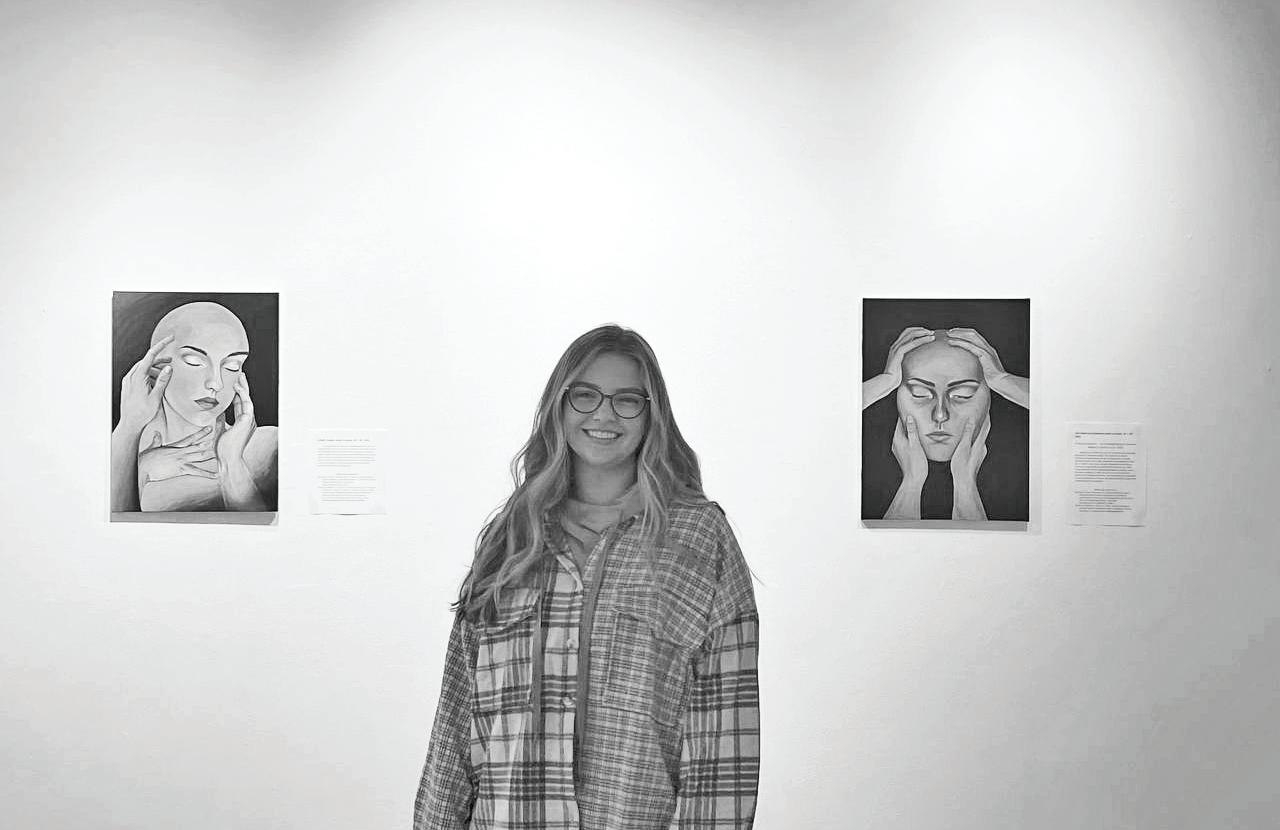
The show features five acrylic paintings relating to the theme of autonomy and personal identity in the healthcare system. Each painting is accompanied with a written description that outlines the inspiration Torhorst took from scientific journals dealing with sexual health, aging and the importance of human connection, especially in relation to one’s ability to take control of their own healthcare.
The initial idea for the show stemmed from Torhorst’s experience last summer shadowing an orthopedic hand surgeon. “I was really confronted with just how important our hands were,” Torhorst said. She was inspired by “this idea of hands and identity — not so much hands in terms of ableness, like the ability to actually use your hands, but hands as a metaphor to connect with others and connect with the world.”
She started working on the pieces for this show during the fall semester, originally planning to paint four works to represent four life stages — childhood, young adulthood, midadulthood and older adulthood. She said the fifth piece, “See Me,” came later and was inspired by the idea of the medical gaze, or how medical
professionals view their patients as bodies rather than individuals.
Her pieces feature distinctive heads and hands that interact and connect in different ways. Torhorst said that in “A Body Touched” she “came up with a composition of hands surrounding this head, that were not only self-curious, … [but] an intimate touch of yourself.”
That painting in particular was inspired by scientific journals regarding sexual health and harm. “So there’s that tension of ‘is that good? Is that bad?’ It’s supposed to be teetering on that line,” Torhorst said. “There are a lot of positives that can come out of sexual health and sexual respect …
I didn’t want the artwork to only be about harm.”
The first piece Torhorst worked on, “Learning How to Be One,” was inspired by her experience as an AmeriCorps member educating kids about emotional awareness and her personal experiences with healthcare.
“I just remember feeling so intruded on as a kid, but not because anyone did anything bad, just because when you’re little and have all these strangers concerned about your body and health, they kind of have to do things that feel intrusive,” Torhorst said. “I feel more able to be in control of my own health, more autonomous with myself, for them having supported me.”
The painting features a head held up by many hands, with a spotlight on a hand prying open the person’s eye.
“The hand is like, ‘I’m opening you up to the world, here’s how to do things,
here’s how to be one. Be yourself, you know, go on to act autonomously,’” Torhorst said.
She said the idea of autonomy intertwines the individual with the community. “The word autonomous implies individualism … you can only be autonomous if you’re in an environment and surrounded by an environment that supports you. Therefore, autonomy relies on interconnectedness, actually.”
The idea of interconnectedness is visible in the intersection of hands holding up and supporting the heads in her pieces.
Torhorst will host a closing ceremony for the show at 4 p.m. on March 10. Torhorst said she hopes people will see her art and ask questions. “I thought it would be fun to have a formal gathering about my artwork,” she said.
Currently, Torhorst is applying for medical school and hopes to pursue a career in the medical field — however, she is not in a rush. “Hopefully, it works out, but if it doesn't work out this cycle, I’m gonna try again. It's not the end of the road for me, it’s what I want to do.”
“I’ve really loved just working
with the community,” Torhorst said, reflecting on her past healthcarerelated experiences. “I just really love the environment of being that leader in their health.” In relation to her role, Torhorst said she seeks to be “hopefully like a friend and a trusted person” to her patients.
As a biology and studio art doublemajor, the connections between the two disciplines are clear to Torhorst. “Because health is such a vulnerable process, just like artwork. Art-making is so vulnerable,” she said.
“Autonomy” is open in the Smith Gallery in the JRC through March 10.
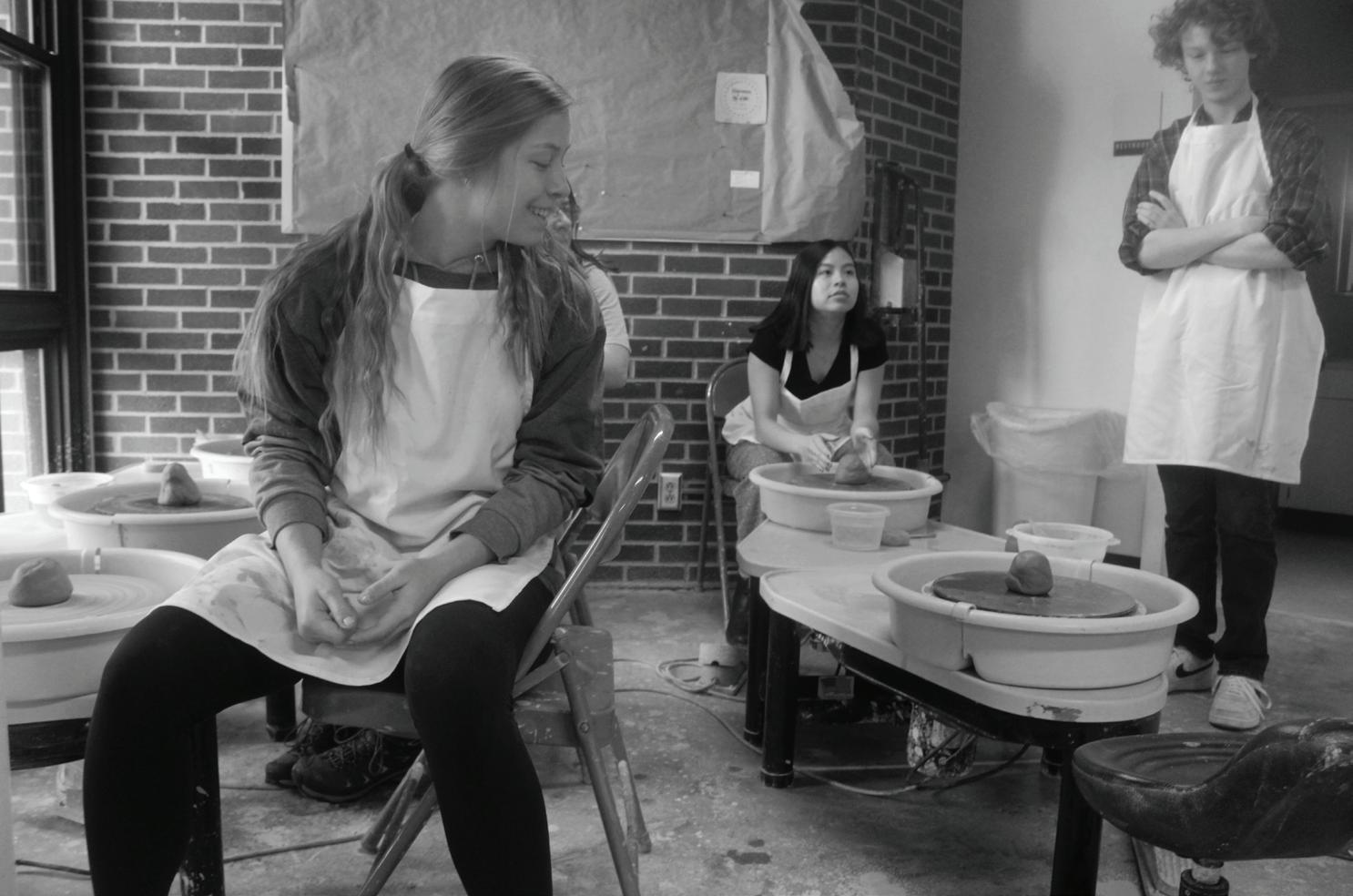
In many marginalized literatures, the essay, or nonfiction in general, is the first to really speak up and refuse to cater.SOFIIA ZARUCHENKO Aubrie Torhorst `23 stands between her pieces "A Body Touched" (left) and "One Needs to be Embraced" (right). OHANA SARVOTHAM Left to right: Kathryn Vermeulen `24, Clara Chaput `26, Evan Hein `26. OHANA SARVOTHAM Student Ceramics Studio monitor Lucy Suchomel `24 (standing) leads wheel-throwing.
From fist bumps to knockouts: Smash at Grinnell hosts tournament
By Ellianna Cierpiot cierpiot@grinnell.eduEvery Super Smash Bros. tournament game starts with a fist bump. In the background, the chatter of friendly warm-up matches and the click of controller buttons can be heard alongside a soundtrack that runs the gambit of Nintendo intellectual property. The pre-Smash fist bump, much like boxers touching gloves, seems to transcend verbal communication in a quiet moment of mutual respect before characters are selected and the real match begins.

On Saturday, Feb. 25, Smash at Grinnell hosted an all-campus Smash Bros. tournament. The competition was organized in bracket style, with 32 participants and culminating in a final showdown on the big screen in the Harris Center Cinema between Joel Choi `23, who placed first in the tournament, and Finn Dierks-Brown `24, who placed second.
to play the game. He watched videos of games on YouTube, he said, and when he came to college, Smash was the first esports game he played in a competitive scene. The club also allowed him to find a new community of people, Choi said.
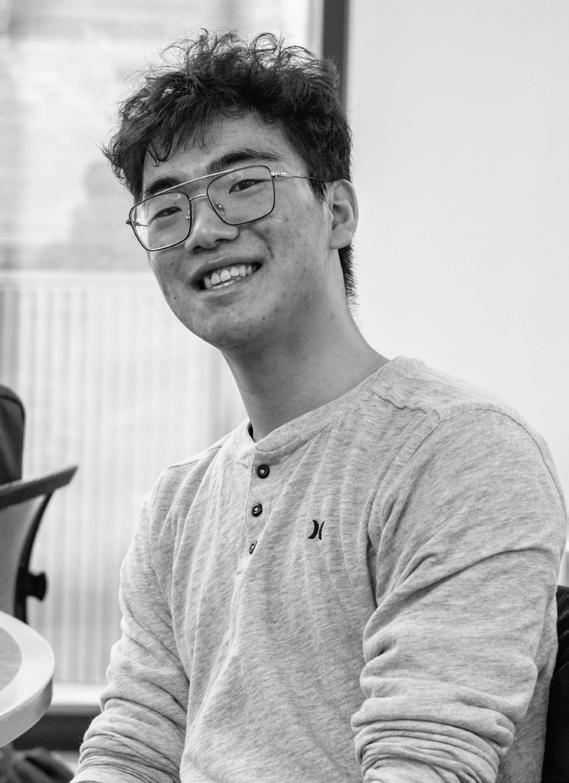
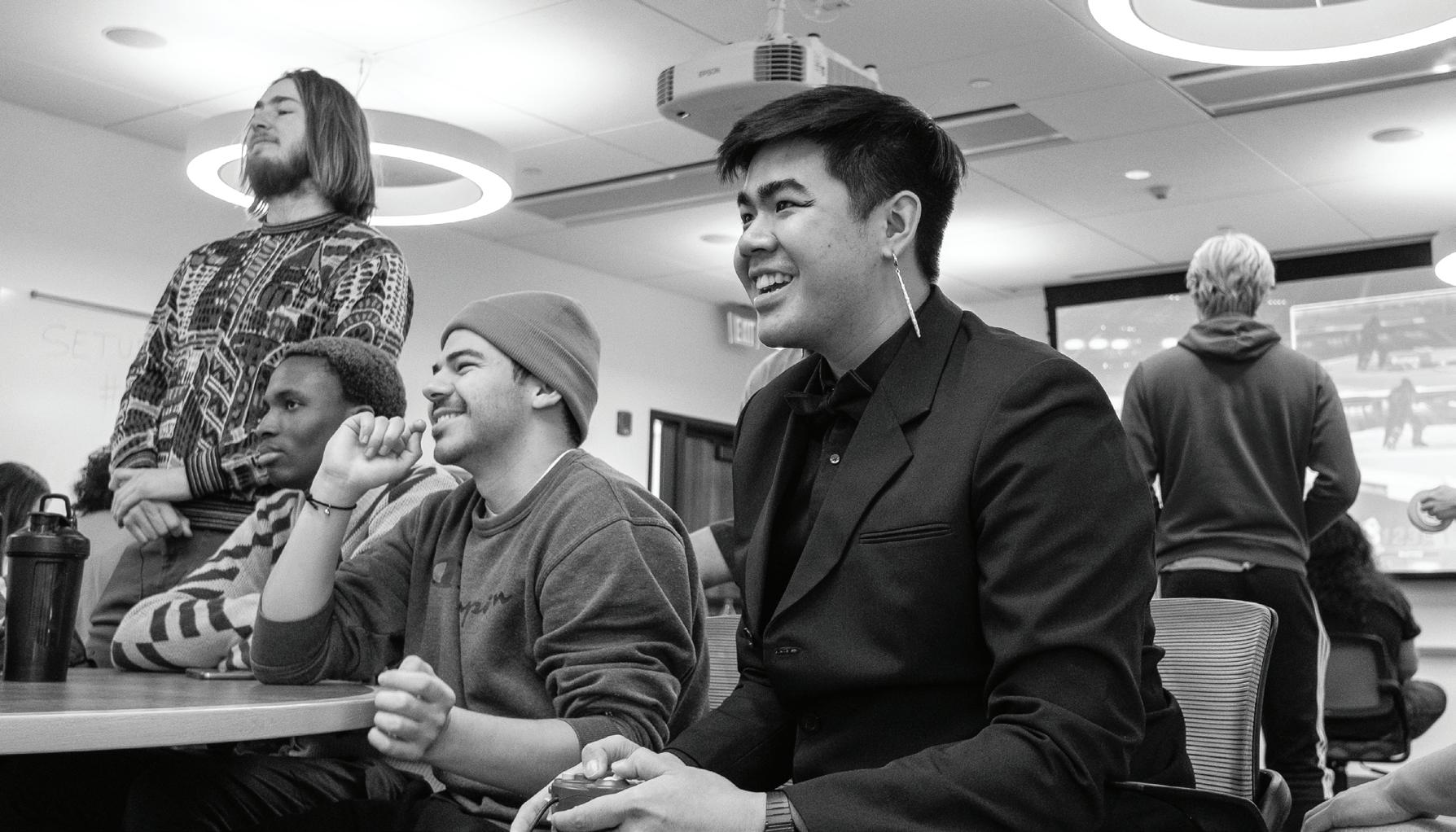
“I was really happy to find this community,” said Choi. “I made a whole lot of new friends here.”
In his first tournament, Choi placed second. This year, he won the tournament playing as Incineroar, a pokémon from the “Pokémon” franchise.
“I play a very heavy character, so I live for a long time, and my goal is to hit as hard as I can and just punish people as much as I can, so that’s kind of my game style,” Choi said.
There are specific considerations to make with a heavier character, according to Choi — Incineroar’s attack strength and move-set also means he is very slow.
“Because he’s heavy, he lives for a long time, and I could take risks which I really like,” Choi said. “If people make one slight mistake, I like to capitalize off of that.”
the game engaging for both players and spectators, according to Axel Saries `25, one of the club’s founders.
When Saries helped found the club, an important consideration was keeping the space inclusive to less experienced players. He said keeping this welcoming environment while also encouraging a fun and competitive one was important to him when organizing the tournament.
Joel Choi `23
Before the tournament started in Humanities and Social Studies Center room N3170, one of the few rooms large enough to host such a competition, the Smash at Grinnell organizers set up stations of Nintendo Switch consoles with a variety of controller options to fit every preference.
A fighting game series from Nintendo, Super Smash Bros. allows players to select a character from a variety of Nintendo properties, ranging from Mario from the “Super Mario Bros” franchise, to Cloud from “Final Fantasy” and Link from “The Legend of Zelda” to duel on a variety of stages also taken from iconic Nintendo games. Each character has a unique set of moves and abilities.
Choi was interested in Super Smash Bros. before he had a chance
However, in the penultimate round of the finals, Choi switched from Incineroar to Cloud, which he said was a response to his opponent switching to Toon Link, a choice that caused the audience watching in the cinema to gasp and murmur. Each round of finals was out of five matches, and by the third match, Choi only needed to win one more, but his Cloud lost to Toon Link. After switching to Incineroar for the final match, Choi secured his first ever Smash tournament victory to the sounds of applause, chanting and the backing music for the Pokémon stadium.
“This is the fourth tournament I’ve competed in and the first time I’ve ever gotten first place, so I’m very thrilled,” Choi said. “I was super nervous, but I had a lot of fun. I think everyone played so well today, and I couldn’t ask for a better tournament.”
The sheer variety offered by the eclectic group of characters keeps
Many of the tournament participants were active members of Smash at Grinnell, but there were some firsttime attendees as well, including Sophie Kempenaar `26, who had played Super Smash Bros. at home but never been to the club. Kempenaar said she preferred to play as female characters, especially Zelda and Corrin, a character from the “Fire Emblem” games.
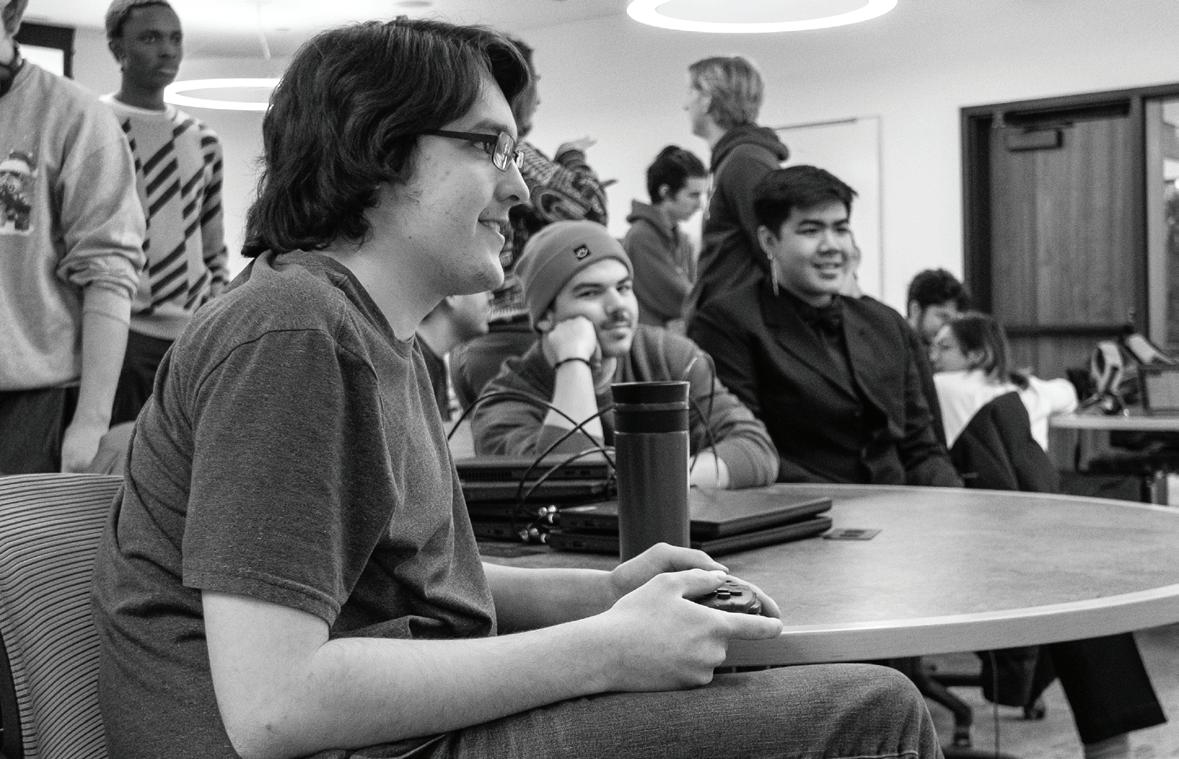
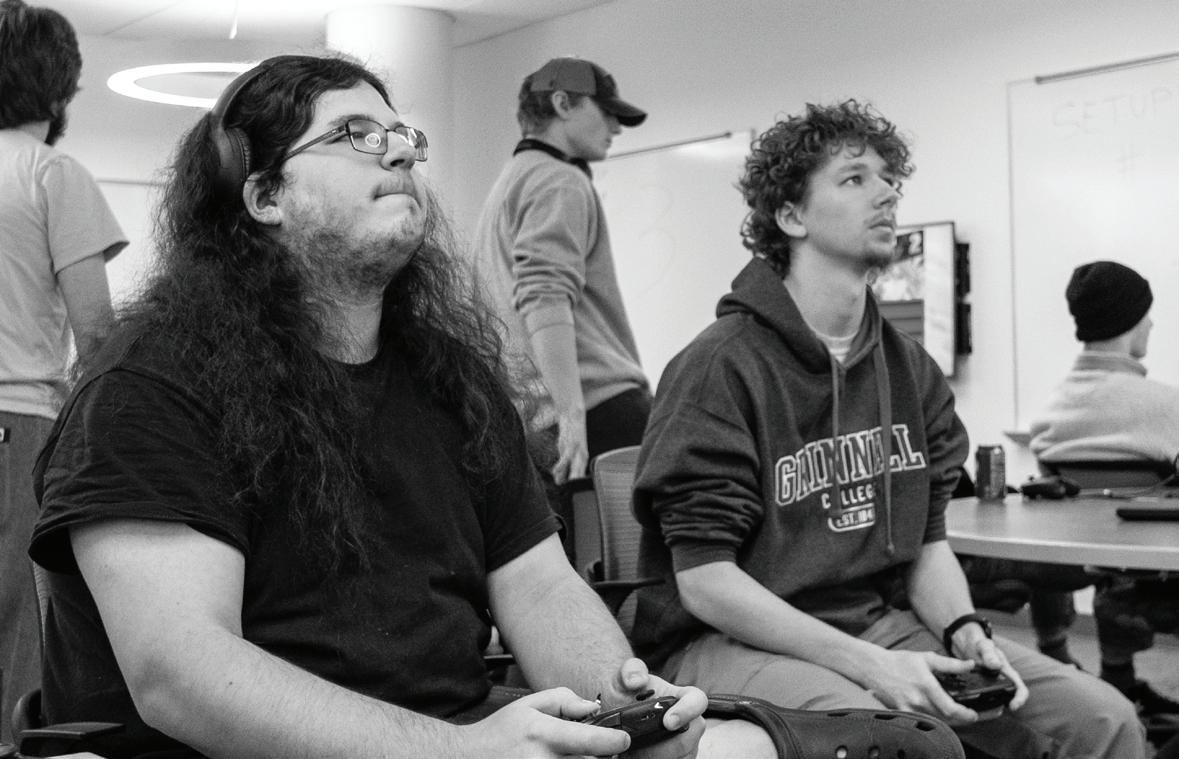
Kempenaar said her main goal at the tournament was not to win, but instead to show up in a space where there were not many women, even if she did not excel. She cited the fact that the number of women on the bracket was in the single-digits.
So I feel by coming here and sucking I’m actually making some sort of feminist statement.
Sophie Kempenaar `26
“I think the standards for women especially are so high, like you have to be so good to even come close to the same level of respect as other people,” Kempenaar said. “So I feel by coming here and sucking, I’m actually mak-
ing some sort of feminist statement.”
Although the stakes are not as high as a professional tournament, it is still very important to players that they do well, Saries said. Thus, it is important to keep things like seating in mind to prevent stress of unfair matchups — especially since the club is small and meets weekly for friendly matches.
Saries said he likes to watch a lot of esports in general, and he is often surprised by the outcomes of Smash games he watches. Because things are so variable, especially when two players are well-matched in skill, it can be easy for a very good player to slip up or for someone unexpected to win.
Because of this variability, no two games are the same, Saries said. This is something that Phukao Prommolmard `25, another club founder, also mentioned.
The tournament matches are best out of three, until the finals, which are best of five. Prommolmard said that even while watching the same players in three or five consecutive matches, the game does not feel repetitive because the players continuously adapt to each other.
“Adaptability is something that’s really important,” Prommolmard said.
Due to the nature of the game, it is very difficult to predict how each player will act and react. But the ability of a player to do exactly that, to predict what their opponent will do next, could make the difference between winning and losing, according to Prommolmard.
“One of the abilities that we talk about a lot is called ‘reading,’ which is when you predict your opponent’s movement, which is some-
thing that usually decides how a match goes,” Prommolmard said.
Zade Mullin `24, another founding member, likes to play as either Zero Suit Samus from “Metroid” or Solid Snake from “Metal Gear”. While playing as Solid Snake against Gus Braun `25, he talked about the differences between playing Smash casually and in competition — even in a friendlier competition, like the tournament at Grinnell, the energy changes.
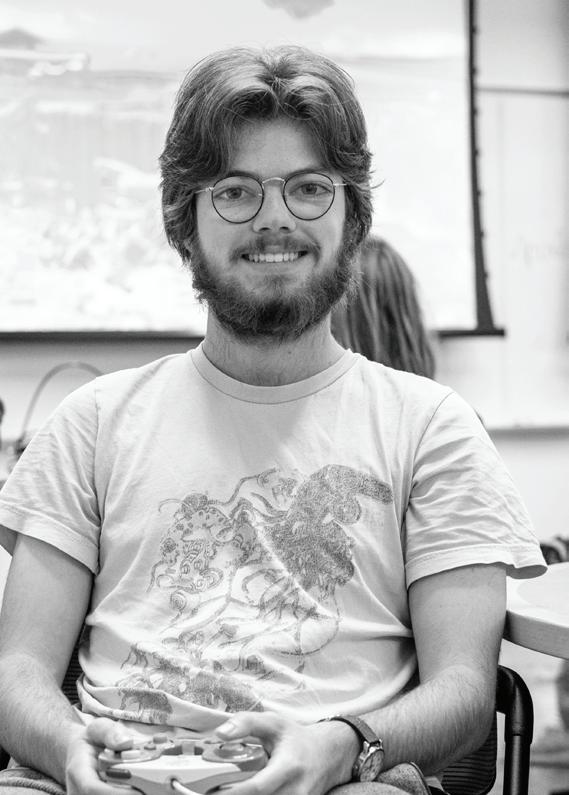
“I feel like when you play competitively, you find yourself, at least for me, I just play significantly better,” Mullin said.
“Some people, when you watch them move just with their character, … you can tell they’re always exactly where they want to be,” Mullin said. “That’s why I like watching competitive Smash, like really high level Smash.”
“So crazy. It’s like, beautiful,” he added.
Women’s tennis returns to play after stellar fall season
By Ashley Baek baekashl@grinnell.eduAfter dominating their fall season, the Grinnell College women’s tennis team returned to play their first match against Cornell College this past Saturday. After a series of stellar performances in the fall, they ranked 31st in the Intercollegiate Tennis Association (ITA) Division III ranking. The results of their March 4 match against Cornell College can be found on the Women’s Tennis page of the Grinnell Athletics website.
“I’m excited to see how we’ll take our best foot forward to play these difficult teams,” said Nichole Henning `26. Henning said that her favorite memory with the team last semester was her birthday in September. “The whole whiteboard was filled with these wonderful notes about me,” she said. “The team is there for all your moments, and I think that’s great. It’s like I have 19 built-in best friends.”
After winning the Midwest Conference tournament last fall, the team is starting their spring season this coming weekend. There were many outstanding performances in the fall, such as Sabrina Tang `23 ranking 13th nationally in women’s Division-III tennis. Tang was additionally voted the Midwest Conference Player of the Year.
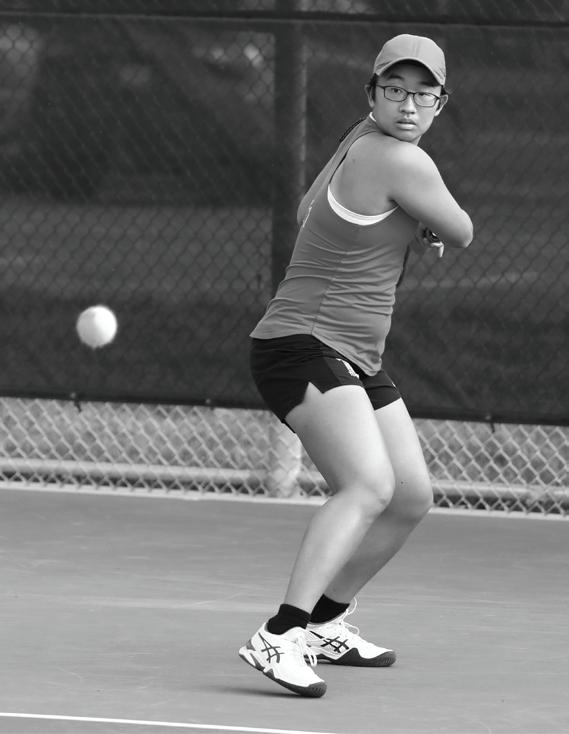
“Last season was really good for me,” Tang said. “The main thing I wanted to do was win ITA [Midwest Regional singles tennis championship].” According to Tang, they won in September 2021 by default. Tang
said the team wanted to see if they could win again despite suffering a sprained ankle. “Coming back from the injury and repeating the win was really big for me,” they said.
I’m excited to see how we’ll take our best foot forward to play these difficult teams.
Nichole Henning `26
Tang sprained their left ankle at the National Collegiate Athletic Association (NCAA) Division III singles tournament at the United States Tennis Association campus in Orlando, Florida last May. However, they played through and won the match. Tang said, “I was chasing down a ball at the net that hit the net card. I was trying to run around it and hit a backhand, and twisted my midfoot.” Afterward, Tang took a 5-0 lead and won their game. In the end, they won the set 6-2.
Tang complimented the team’s accomplishments, saying, “we won conference again, and then we had a doubles team make it pretty far in the ITA tournament as well.”
Joanna Giannakou `24.5 said that her highlight of the season was winning the Midwest Conference tournament. “We had five out of our six players win singles matches and one doubles team win a match,” she said. “I’m looking forward to playing nationally ranked teams and
defending our national ranking.”
When asked about standout performances, Zack Hasenyager, head women’s tennis coach, pointed to Tang’s and Giannakou’s performances at the quarter-finals of the ITA. He also applauded Erin Jarvis `25 and Lily Perrin `25, who made it to the semifinals of the doubles tournament. “I think that was really exciting for us to see the success on the doubles team,” said Hasenyager.
“I’d like to see us continue to not be satisfied with the idea that we’re ranked nationally but be challenged by that opportunity to increase the ranking and to think of ourselves in the capacity of a top 20 team in the country instead of a top 40 team in the country,” said Hasenyager. “[I’d] love an opportunity to prove that against some really good competition over the course of the next two months.”
I play a very heavy character, so I live for a long time and my goal is to hit as hard as I can and just punish people as much as I can, so that’s kind of my game style.
Connecting to resources: It’s time to talk about eating disorders

It took me a long time to want to get better. I knew the things I did to my body were objectively bad, but they didn’t feel bad. I was keeping up with my academics and athletics, and I appeared perfectly healthy. It took seven years for me to really break down.
When my therapist told me I needed treatment, I became angry and defensive, but ultimately I agreed to go. I wasn’t experiencing life fully, always half-absent and busy battling voices and urges. I didn’t want to live that way anymore. The clinical term for this turning point is “readiness for change.”
Birant Akbay, doctoral practicum student at Grinnell, elaborated, “when an athlete reaches out for help, that’s a very critical period where you need to try to connect that person to help.”
I know several individuals who reached this stage at Grinnell, and I struggled to help them. We do not have adequate resources on campus. The College only provides brief goal-oriented therapy, meaning 6 to 10 sessions, and none of them specialize in eating disorders. During my search, I was unable to find an eating disorder therapist or specialist in the town of Grinnell.
However, in addition to Akbay, the College has also brought in another doctoral practicum student, Jessica Pauley. Both provide therapy for athletes, but without the additional resources needed to support eating disorders holistically, there’s only so much they can do. Akbay said when he works with athletes at the University of Iowa, “We always include a registered dietician and team physician. That care is essential for the interdisciplinary holistic approach. I would love to be able to do that at Grinnell. I think it’d be really effective here because it’s proven to be effective in other areas, but we just don’t have that resource yet.” Beth Perlman, clinical director of Student Health and Wellness (SHAW), further elaborated, “they are cultural, medical, psychological and interpersonal, so a lot of different pieces to disordered eating treatment.”
Nevertheless, resources still do exist. One silver lining from the pandemic is that telehealth has become more readily available. Students can connect therapists who specialize in eating disorders, and dieticians in Des Moines and Iowa City, by accessing SHAW’s Virtual Care Group. The biggest issue may actually be the lack of information on how to access these resources. I browsed
through some pamphlets in SHAW and found that most deal with alcohol use, illness and sexual health, but no information about eating disorders. Because there is so little direct information about disordered eating and behaviors, the onus of finding resources is placed on students.
When I met with Perlman, she couldn’t give me any specific names of eating disorder specialists in town. I had to sift through the list of providers she gave me myself. Perlman told me that the College does have a registered dietician, but when I reached out, I discovered that Britt McConnell does not work with students, and her expertise is in food service, not healthcare.
This kind of work is time-consuming and exhausting, and given all the demands put on Grinnell students, they certainly don’t have the extra time to be doing all this research. Because the desire to recover is already so nuanced and complicated, I fear that if someone wants help, the time suck of finding resources may just prevent them from getting the care they need. Additionally, while virtual care can be effective for some, disclosing the intimacies of an eating disorder (a personal and stigmatized illness) and trusting someone whom one has never met in person can also be a serious deterrent.
Nothing is more important than your wellness, so even though it might be daunting, seeking out resources is worth it. Starting at SHAW, you can check if you are medically sound. If you have been engaging in eating disorder behaviors, checking in on your health is crucial as you often won’t know there is a problem until it’s too late.
A fantastic resource in Grinnell is Libbi Hoel (libbihoelnutrition@ gmail.com), a registered intuitive eating counselor who recently opened her own practice in Grinnell, though she
currently only sees patients virtually. She works as a dietician, but talks with her clients about much more than food to manage recovery. Intuitive eating refers to our ability to eat according to our bodies’ needs, which can be incredibly difficult for those struggling with eating disorders. After years of malnourishment, the person suffering often doesn’t have access to interoceptive awareness. For example, this often affects hunger cues — for almost a decade, I quite literally could not tell when I was hungry or full. Navigating this is one of the many aspects that makes recovery hard, and it is why having a holistic approach to recovery is crucial.
Hoel, Perlman and other counselors at SHAW are great resources not only for those struggling with eating disorders, but also for friends of those with eating disorders. Both Hoel and Perlman individually offered to do over-the-phone consultations to talk through options to help a friend in need.
Indeed, most people are unsure of how to support friends who are struggling with eating disorders. All of the professionals I spoke with emphasized approaching the situation without judgment. Perlman recommended, “first sharing concern, sharing your observations. My approach is doing that through a direct behavioral observation. I think that’s a non-judgmental way to start a conversation. That might look like, ‘I noticed that you haven’t been coming with us to the Dining Hall lately. I just wanted to see if everything was okay.’”
After sharing your concerns, you can then see if the person struggling is open to connecting to resources with you. Offer to go to SHAW with them or call Hoel together. This is really all you can do as a friend. Perhaps the hardest part of supporting someone
with an eating disorder is accepting the fact that you cannot force them to get help. Trying to stop them from engaging in behaviors isn’t your job. Your job is to be a support and connect them with resources. This is difficult, I know, but Akbay assured me that not policing their behavior doesn’t mean you are doing nothing.
“As long as we’re opening the door and letting people know that, ‘I’m available should you wish to come to me,’ that’s doing something,” Akbay said. “That’s actually doing a lot because there’s a hope that then the client would feel that this is a safe person I can talk to as a non-judgmental space that I can enter into when I’m ready.”
Eating disorders aren’t rational, and if someone is not ready for change, they just need a friend. When we come at someone with an accusatory statement, that will likely only push them away. But by instead showing others your support, hopefully the person struggling will become ready for change on their own.
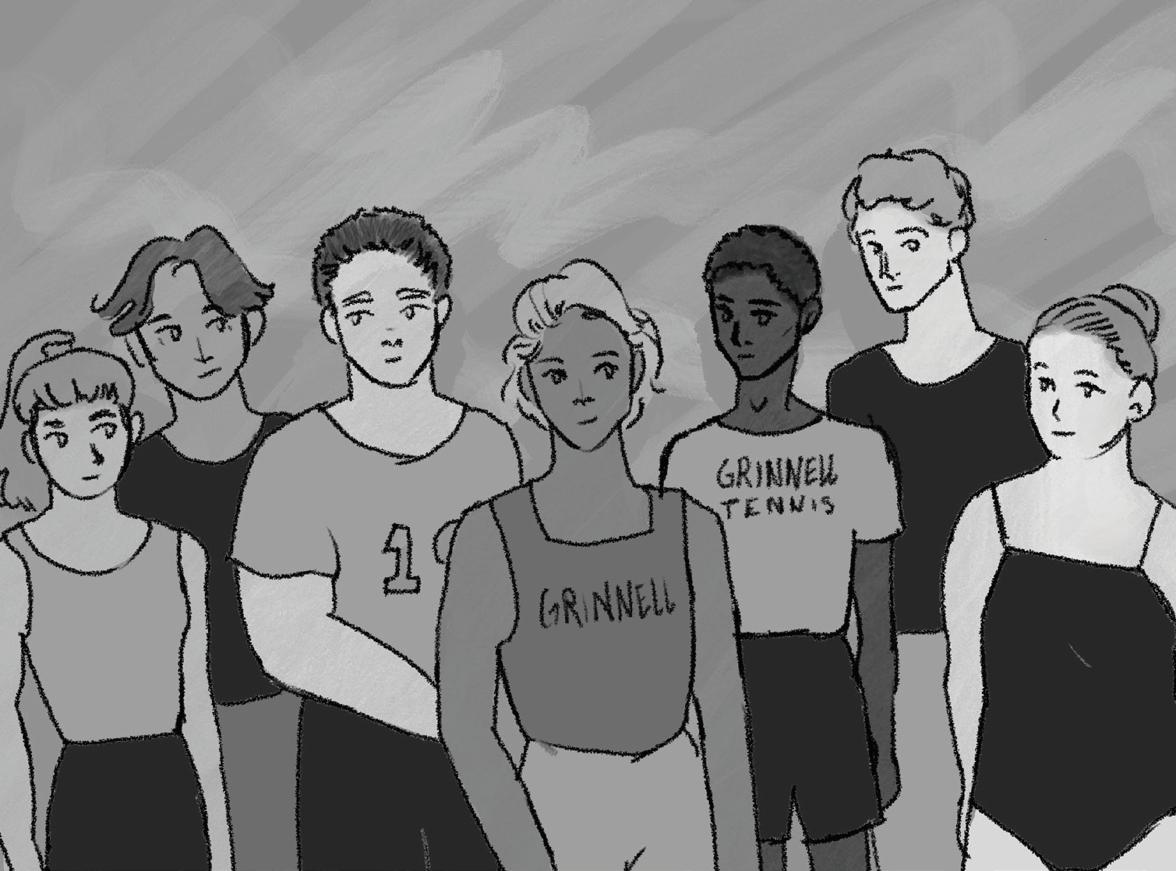
All of this conversation, however, highlights to me that we need more clinical resources, but it also shows people to learn how to have conversations about these topics. Sports teams are mandated to partake in training to learn about safe drinking and active bystanderism, and Student Athlete Mentors receive suicide prevention training. We need similar mandatory training to learn how to talk about eating disorders.
Additionally, there needs to be better access to food. My dietician was appalled to learn I went six hours between meals, but when we have three meal swipes a day, that becomes the norm, especially since we are not allowed to take food out of the Dining Hall. Jokes are often made about athletes taking multiple sandwiches, but they do that because they need the calories, and they have to get most of their food in one sitting. Would it be so hard to allow students to take a snack with them to go? The Global Café and the Spencer Grill are the only other food options on campus, but the prices make many students feel that they would rather go without food than pay for an expensive snack. Better access to food is just one way that the College could take a preventative approach.
Much more can be done to catch disordered tendencies before they become an eating disorder. The level of perfectionism it takes to balance a Grinnell course load, even without a job, sport or extracurricular activity, promotes controlling behaviors that can fuel eating disorders. Students are
managing living away from home and being in charge of their own food for the first time. We are creating the perfect environment for eating disorders to flourish, and that means we also need to provide adequate resources to combat them, only starting with a registered dietician.
In my interviews, athletes shared that they are provided with little to no guidance on how to properly fuel their bodies. When I spoke with one student in a strength-based sport, he told me, “I feel like because everybody’s trying to either gain or lose weight. We need to help each other figure that out — what to eat. Bigger programs [at other colleges] have nutritionists and stuff, which is totally different than here. Here, we have zero direction, really.”
So I’ll emphasize again — we need basic resources to learn how to fuel our bodies. Coaches also need training. Often, an athlete’s performance actually increases when first engaging in disordered behaviors, and even though this performance eventually tapers off, it can make it difficult for coaches to believe that someone is really struggling. Coaches that emphasize an athlete’s performance over the individual person often fuel eating disorders. Therefore, coaches need to know the role they play in both eating disorder development and recovery, and they must be given the tools to support their athletes, especially because coaches are often the first person that people go to when worried about a teammate. We need policies to ensure that coaches connect athletes with the proper resources when a teammate notifies them of someone in need. My interviews led me to believe that sometimes coaches do not act. This is unacceptable.
Campus-wide, we need more dialogue. We need to talk about eating disorders and fatphobia at New Student Orientation, we need pamphlets at SHAW and training for students and coaches. The College knows this is an issue — in fact, Perlman said she plans to develop a multidisciplinary task force — but they need the push from students to make combatting this issue a priority. If you or a friend is struggling, please let the College know what they can do to support you. Your desire for support is not unreasonable, it is simply human.
I hope that if you or someone you love is struggling this series has given you some tools and courage to begin speaking on this issue. No one person can do it alone, and I promise you the journey to recover, to live each day fully, is worth it.
Food for Thought: We are all crêpes
By Gabby Hernandez hernande6@grinnell.eduRecently, I have been having a bit of a quarter-life crisis. For much of my life, I was comfortable with the fact that 200 years from now there will probably be no one that remembers the current me as I exist in this moment. For some strange reason, I am no longer comfortable with that. I blame food. You see, it was while eating the S&B community editor’s delicious and internationally-worshiped crêpes that my thoughts about the human condition shifted.
With his cup of batter in one hand and fully set plate in another, Jandry poured a perfectly circular sheet of batter onto the hot pan on the stove. There was no splash. There was no deformity. The grace of a Winter Olympics ice skater and precision of a Summer Olympics archer were present within him as he flipped the crêpe over. It landed perfectly onto the pan.
The crêpe held a slightly golden hue once it was fully cooked. In one
fluid motion, the chef spread a smooth dark chocolate filling over its surface and quickly folded it in half. Layer one was complete.
Two more crêpes were prepared in this manner. They were laid on top of each other like Lincoln Logs. An overhead view easily revealed the sophisticated three-quarters full, PacMan-esque stack of crêpes. The editor-in-chef then spread another layer of dark chocolate filling onto the topmost crêpe. The finishing touches — a slight application of powdered sugar and a strawberry cut into the shape of a rose — completed this dish with a refinement never before seen in the world of crêpes.
I was excited to dig into this masterpiece of a dish, but it almost felt disrespectful to cut off the first piece.
“Who am I, a mere mortal, to consume this gift from the gods?” I thought.
Nevertheless, I ate.
Rich. Those crêpes were mindblowingly rich. The strikingly sweet strawberry was the perfect fruit to
The Scarlet & Black Staff Spring 2023
Nadia Langley
Allison Moore
Lucia Cheng
Ellianna Cierpiot
Eleanor Corbin
Lilli Morrish
Mohammad Igbaria
Jandry Perez Garcia
Millie Peck
Samuel Bates
Nora Kohnhorst
Maddi Shinall
Cornelia Di
Gabriela
compliment such a powerful flavor. Together, the dark chocolate and strawberry ruled this dish with an iron fist. As a vessel, the crêpe perfectly supported these two loud flavors with a subtle and sturdy flavor of its own.
The more I ate, the more I thought.
I felt strongly for these crêpes. Would I remember them ten days from now?
Ten years from now? Certainly not. I realized that on a larger scale, we are all crêpes though legendary, we are ultimately lost to time. In many ways, that is terrifying. In other ways, that is freeing.
I ate some more. I thought some more. The essence of humanity, as it appeared to me as I drifted off into a crêpe-induced slumber, lies in our ability to feel so much. We are able to perceive, create, absorb and theorize. The things we perceive, create, absorb and theorize about, then, have the power to induce so many subsequent thoughts, feelings and understandings. I think that is beautiful. Scary-beautiful.

